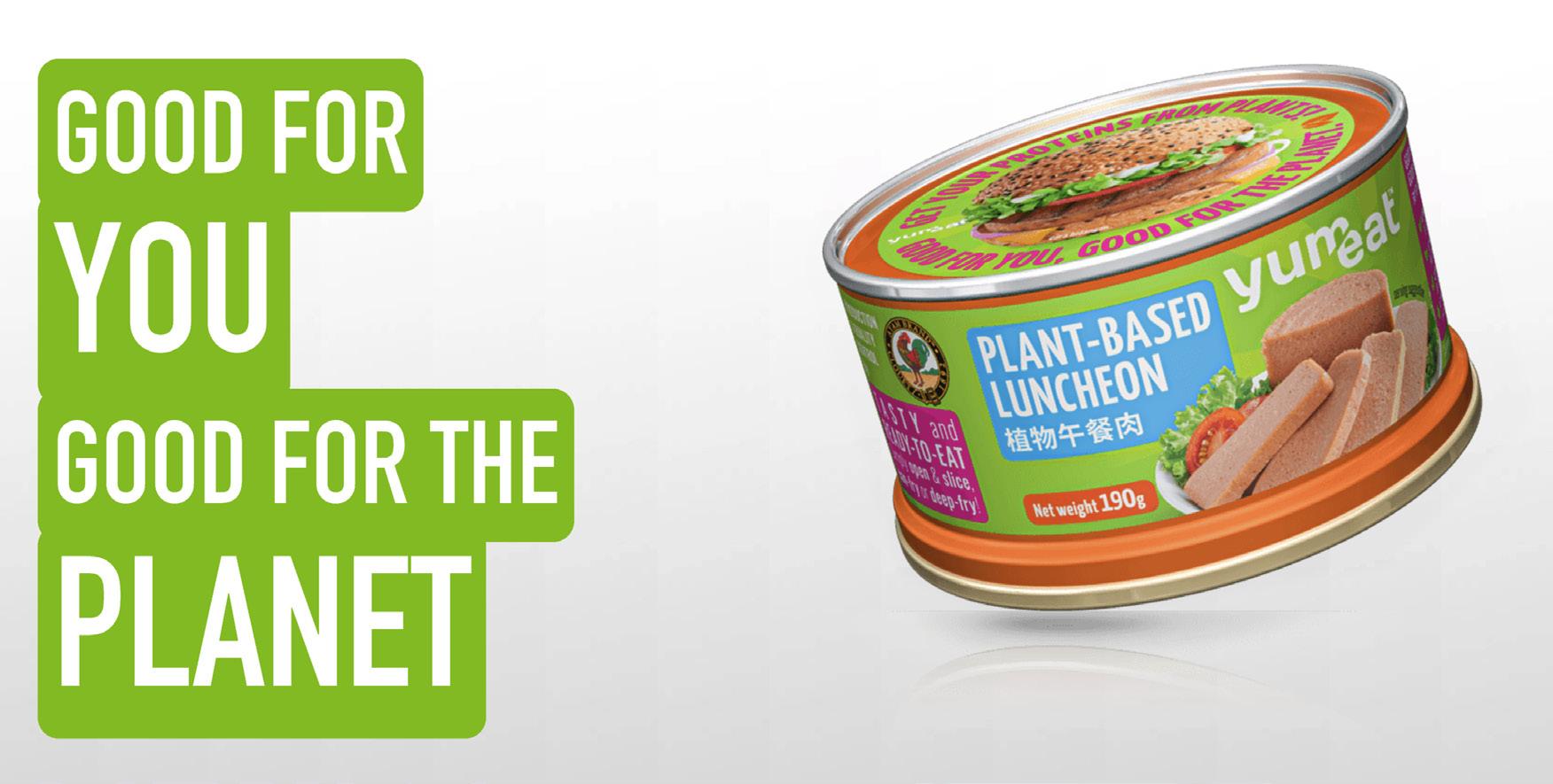
E.S.G. REPORT (Environment, Social and Governance) Publication 06 Year 2022 We are committed to Carbon Neutrality by 2040. Track our prog re ss on www. MaisonDenisESG.n et . ww w. MaisonDenisES G. net. MAISON DENI S SUST AINABL E COMMITMENT S RESPONSIBLE PRODUCTION & SUPPLY ALL GREEN BUILDINGS BY 2030 BEST HR & GENDER EQUITY PACKAGING RECYCLABILITY BY 2030 SOLAR & ENERGY OPTIMISATION DENIS ASIA PACIFIC PTE LTD
Our main ranges of products (pelagic fishes like sardines or mackerel, coconut products, beans, soya sauces...) are already among the foods with the lowest carbon footprint. With yumeat™, a plant-based protein food trademark we remain loyal to our offer of quality affordable foods, that protect the world’s resources for the future.
D e n i s A s i a P a c i f c P t e L t dE . S . G . R e p o r t 02

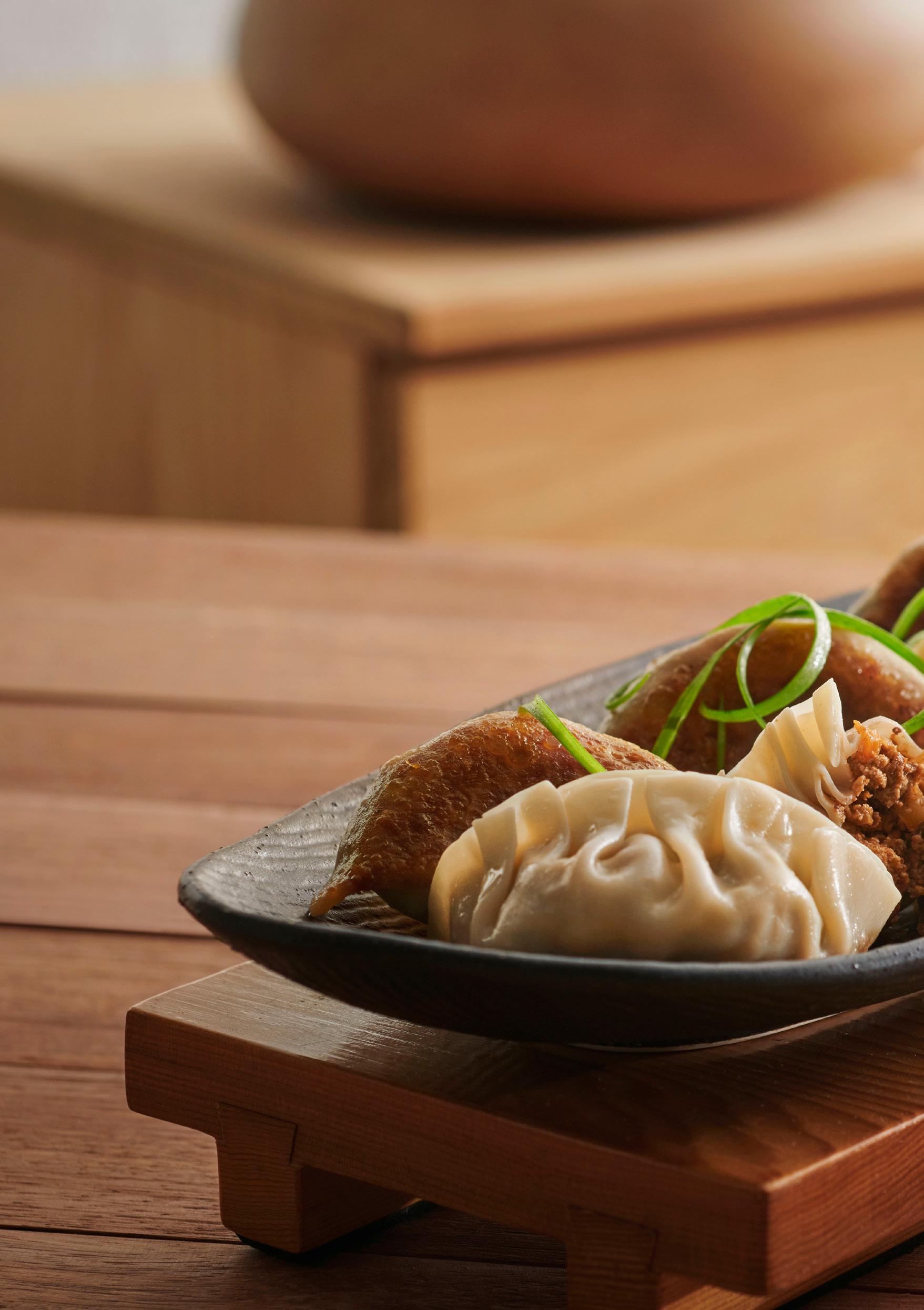
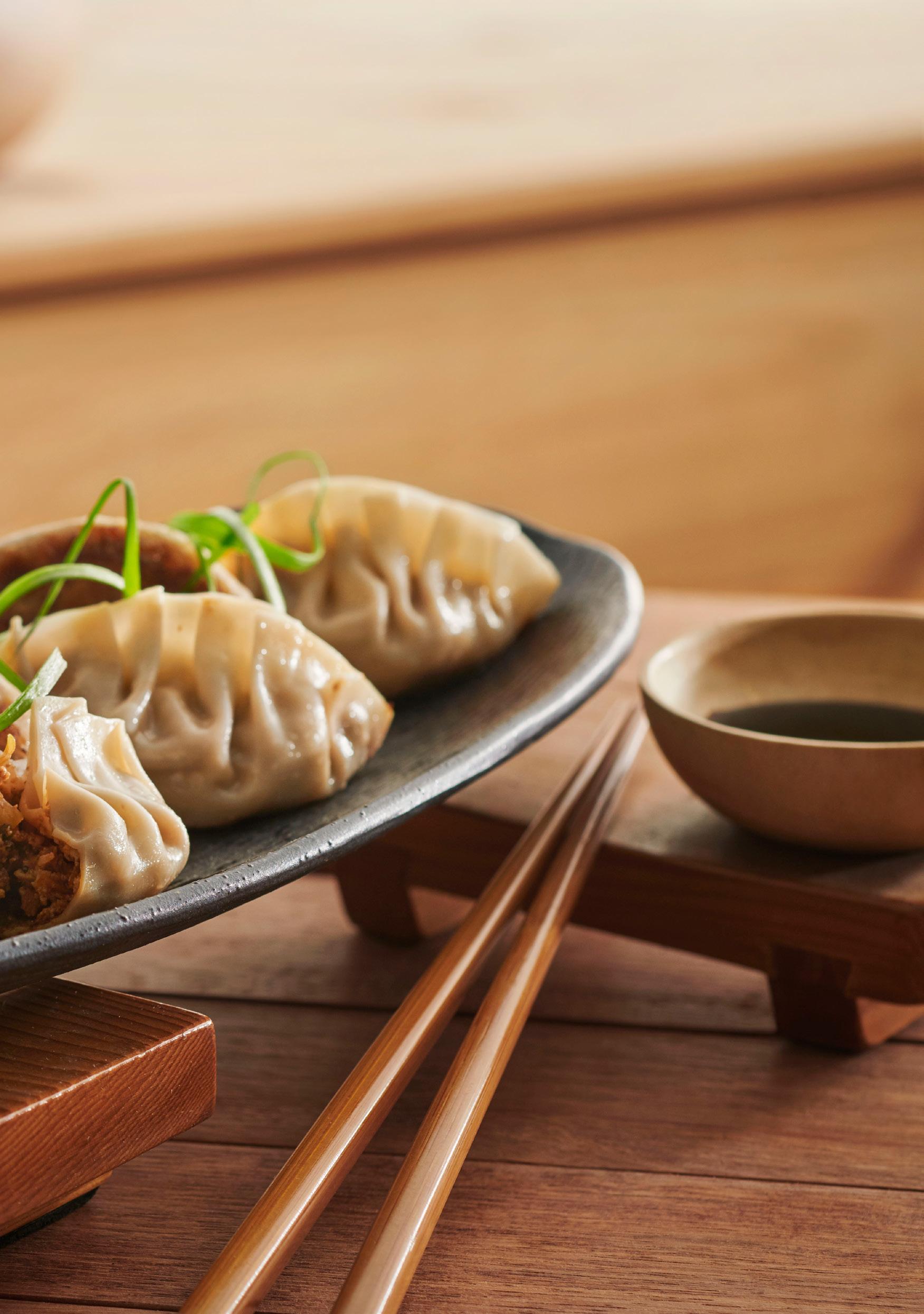 Gyoza done with yumeat™ plant-based Minced Meat
Gyoza done with yumeat™ plant-based Minced Meat
D e n i s A s i a P a c i f c P t e L t dE . S . G . R e p o r t 06 Our commitments From our Chairmen & from our CEO 16 About Maison Denis New Corporate Identity & Awards 17 U.N. Global Compact 25 Our nine 2022 pledges’ results 31 Our E.S.G. plan 35 About this report 42 The 2022 scorecard 46 About Denis Asia Pacifc 48 58 Environment GHG emissions 59 Energy optimization 64 Solar Energy 68
P u b l i c a t i o n 0 6Y e a r 2 0 2 2 07 Resource management 72 Packaging 78 Environmental certifcation 82 Supply chain sustainability 87 102 Social Responsability Our people 103 Our Consumers 120 Our World 126 134 Governance Governance & Ethics 135 Conclusion
From our Chairmen
All companies are under pressure to make meaningful contributions to a more sustainable society, aiming for a more positive economy; they are challenged to examine their impact on environmental and social resources.
We are ultimately responsible for the tone at the top which will cascade down to every level of the company and for overseeing the implementation of our company’s long and short-term strategic plans; these play a crucial role in fostering an environment that will support the embedding of sustainability into the strategies of the companies, for which we are the moral compass.
Our voice, attitude and decisions must signal a willingness to our companies’ management toward elevating social justice, creating business value and meeting regulatory & environmental responsibilities. We encourage and push our companies to set sustainability objectives that are in line with what makes the most sense for our businesses.
The Denis family has embraced the journey toward sustainability as this was both a natural transition and adaptation of the Group’s historical values to the world of today. We remain convinced that we all have a duty to do our part in search of positive impacts to protect our planet and be proud to be able to pass it on to future generations.
D e n i s A s i a P a c i f c P t e L t dE . S . G . R e p o r t 08
For our 160th anniversary in 2022, we decided to change our corporate identity, which now includes our main ESG objectives in our logo and in our external communication. This demonstrates a frm commitment to our long-term strategic plans, such as achieving carbon neutrality by 2040 and using only recyclable packaging in our factories by 2030.
Experience of the long term for a company like ours and of this age allows us to be credible in our choice of objectives and to have the ability to achieve them.
For family shareholders, sustainability could ultimately be defned as the greatest desire to leave the most appropriate legacy for future generations :
- a successful Group that our employees are proud to work for in a safe environment and that shares our values
- trusted, high quality and innovative brands that our customers are proud to buy from generation to generation, and
- a sustainable Group with over 160 years of history and experience that we are proud to own and pass on to future generations.
The 5th generation descendants of founder Etienne Denis are indeed very proud to sign this sixth ESG report. We would like to take this opportunity to thank once again each and every employee and partner for their tremendous efforts, support and creativity in continuing
P u b l i c a t i o n 0 6Y e a r 2 0 2 2 09
with us to make this sustainability journey possible. The recognition of our efforts proves the importance of this journey and motivates us all the more to go the extra mile.


D e n i s A s i a P a c i f c P t e L t dE . S . G . R e p o r t 10
Daniel Denis ESG Committee Chairman Vice-Chairman of Maison Denis SA.
Nicolas Denis Chairman of Maison Denis SA.
P u b l i c a t i o n 0 6Y e a r 2 0 2 2 11
From our CEO
As we enter 2023, I am pleased to report on ESG achievements for MAISON DENIS over the past year.
There is no doubt that 2022 was a year of great challenges. As we emerged from the threat of COVID-19, we faced major supply chain constraints together with growing inflationary pressures. Our improvements on SOPs, as part of our ambition to deliver essential goods to local communities, helped to mitigate cost impacts on consumers.
This was done without compromising our sustainability strategy that remains at the heart of our activities, whilst our ongoing work continues to drive positive change across our ecosystem.
This ESG report demonstrates that over the period, we have remained on track with all our targets, as defned and regularly updated by the ESG committee.
On the anecdotal but signifcant side, I would like to point out the implementation in our company of digital business cards; this in order to help tackle the issue of enormous waste generated by the 11 billion cards printed worldwide per year, 90% of which end up in the bin.
I would like also to emphasise our efforts to make training more accessible; we have invested in e-learning capabilities to allow our staff to train at their convenience. In 2022, this allowed us to involve
D e n i s A s i a P a c i f c P t e L t dE . S . G . R e p o r t 12
all our offices in an anti-corruption program and cyber-security training.
We are progressing fast in ESG technical knowledge to be able to make science-data based investments in order to reduce our GHG emissions and to better integrate into a future circular economy.
We continued exploring & developing new products and new investments that will be essential in the future, from healthier to alternative proteins, while working to develop sustainable packaging solutions.
Our sustainability efforts remain at the forefront of the business and represent an important part of MAISON DENIS, consistent with its vision for the future. We recognize that we cannot make all these changes alone as sustainability is a collective effort.
I am grateful for the ongoing efforts of those within DENIS, our partners, and our consumers. I would like to take the opportunity of this message to express my appreciation to all stakeholders who work towards a more sustainable model together with us.
Fabien Reyjal Chief Executive Officer
P u b l i c a t i o n 0 6Y e a r 2 0 2 2 13
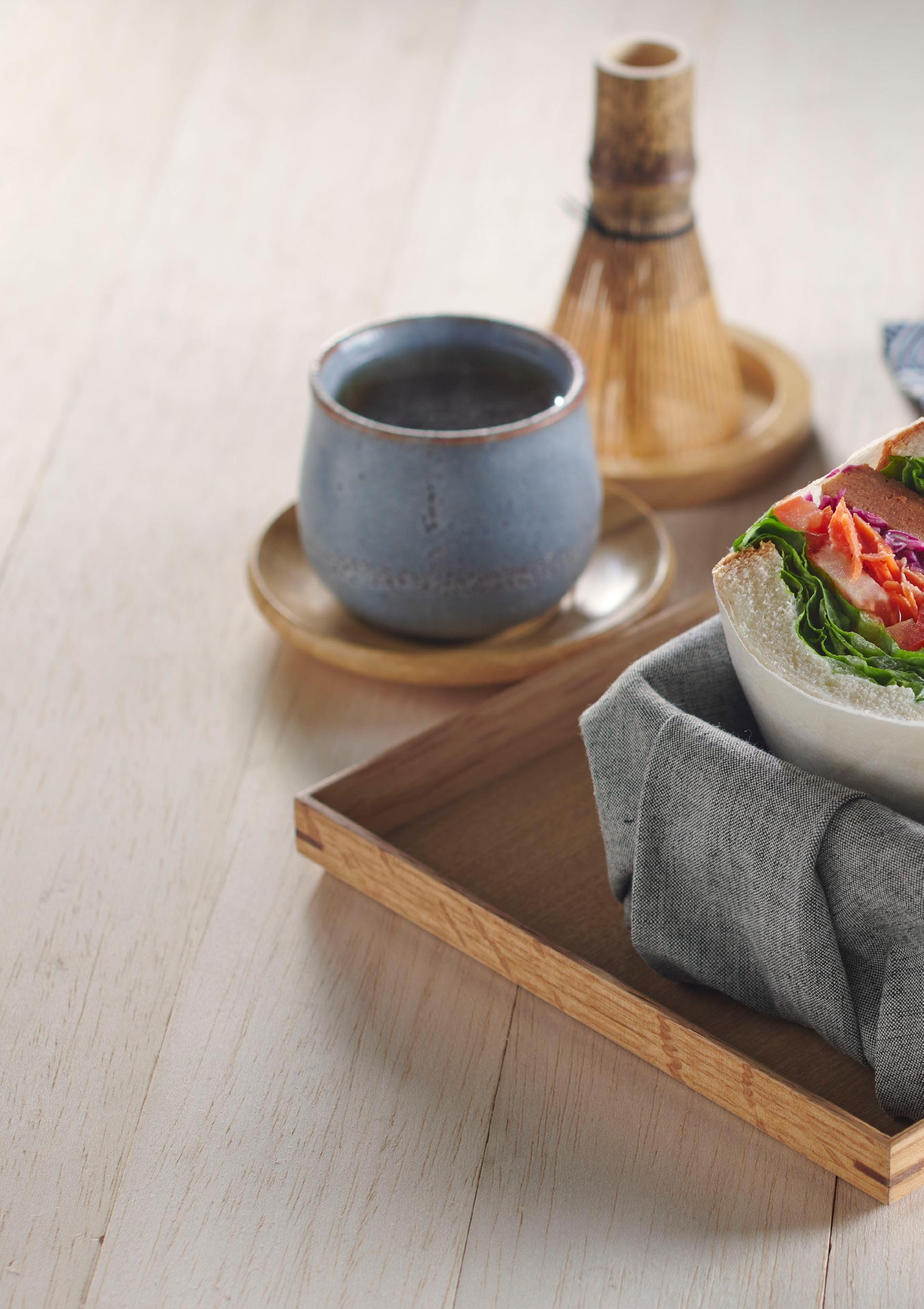
 Yumeat™ plant-based Luncheon
Wanpaku Sandwich
Yumeat™ plant-based Luncheon
Wanpaku Sandwich
About Maison Denis
D e n i s A s i a P a c i f c P t e L t dE . S . G . R e p o r t 16
New Corporate Identity & Awards
In 2022, the company celebrated its 160th anniversary. The management team decided to revamp the company’s corporate identity, such that the main ESG objectives form part of its logo and its external communication.
Every year, DAP also submits its annual ESG report to awards competitions as part of a benchmarking process and to identify areas of potential improvement.
New Corporate Identity
Maison Denis
The management team decided to drop the word “Group” which was an inaccurate portrayal of our businesses. Since the beginning, “Maison Denis” or “La Maison” (“home” or “house” in French) was the internal nickname to designate the company, and by extension all personnel throughout the organization.
The name “Maison Denis” carries three important and meaningful messages :
(1) The name evokes the French origins of the company and the fact that ownership has remained within the same family for 6 generations.
(2) The «Maison» designation is frequently used for a French company with a long history and specifc know-how.
(3) More importantly, the notion of “Maison” must also convey the
P u b l i c a t i o n 0 6Y e a r 2 0 2 2 17
human values of a place of business that cares about its employees, partners, and customers, as if it were a family under the same roof.
ESG objectives in the company’s logo
The management team strongly believes that ESG values and targets need to exist and to be visible each and every day, in order that they remain uppermost in the minds of our employees and partners.
We are commit ted to Carbon Neutrality by 2040.
(1) The logo
The company’s logo is now complemented by a colourful and clear description of our top priorities. Three key milestones indicate the corresponding planned dates of completion.
- Carbon neutrality by 2040
D e n i s A s i a P a c i f c P t e L t dE . S . G . R e p o r t 18
MaisonDenisES G. ne t. MAISON D ENIS SUST AINABL E COMMI TMENTS RESPONSIBLE PRODUCTION & SUPPLY ALL GREEN BUILDINGS BY 2030 BEST HR & GENDER EQUITY PACKAGING RECYCLABILITY BY 2030 SOLAR & ENERGY OPTIMISATION
Track our prog re ss on www.
- Recycled packaging by 2030
- Green certifed buildings by 2030
Three priorities indicate the main values in operating our businesses:
- Responsible production & supply
- Solar & energy optimisation
- Best HR & gender equity practice
The logo is complemented with a website to track our progress.
(2) External communication
To make the ESG commitments visible to all stakeholders and also to the general public, the new corporate identity is visible in 3 key elements:
- In our new corporate website, denis.com
- On our company’s letterheads
- On our business cards
We have opted out of the traditional use of business cards by implementing MOBILO, the smart digital business card. We are now using both NFC chips and QR code technologies to share our staff details. In doing so, we are ending the use of paper business cards which represent a signifcant waste of resources.
 Guillaume VIRANTIN Group Senior Digital Manager Denis Asia Pacific Pte Ltd Maison Denis, 1862
Guillaume VIRANTIN Group Senior Digital Manager Denis Asia Pacific Pte Ltd Maison Denis, 1862
P u b l i c a t i o n 0 6Y e a r 2 0 2 2 19
We are committed to Carbon Neutrality by 2040. Neutr Track our prog re ss on ww w. MaisonDenisESG. net.www.MaisonDenisESG.n et MAISON DENIS SUS TA INABLE COMMITMENTS RESPONSIBLE PRODUCTION & SUPPLY ALL GREEN BUILDINGS BY 2030 BEST HR & GENDER EQUITY PACKAGING RECYCLABILITY BY 2030 SOLAR & ENERGY OPTIMISATION
Summary of ESG awards
SEAL Awards 2021
The SEAL (Sustainability, Environmental Achievement & Leadership) Awards is an awards-driven environmental advocacy organization. Their core beliefs maintain that our environmental progress requires true leadership, leadership deserves recognition, and recognition is a form of accountability.
Sustainable Business Awards Singapore 2021
The Sustainable Business Awards (SBA) has two key objectives – to recognize and honour the efforts made by companies in making the world a better and safer place.
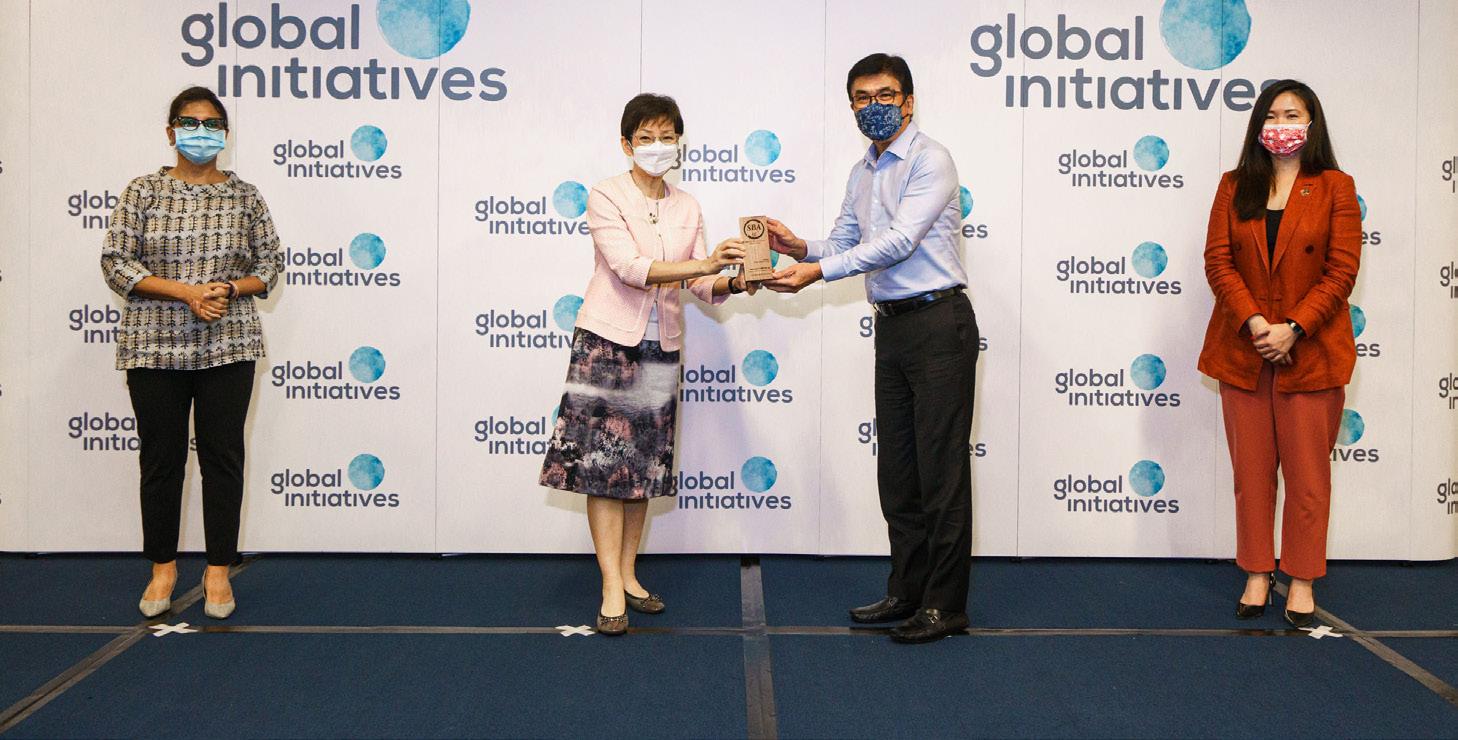
D e n i s A s i a P a c i f c P t e L t dE . S . G . R e p o r t 20
DAP was the proud winner of the Sustainability Strategy Award presented by Mrs Grace Fu, the Minister for Sustainability and the Environment.
Our second SBA Award was the prize for a Significant Achievement for Energy Management.
ACES Top Green Company in Asia 2020
The Asia Corporate Excellence & Sustainability Awards (ACES) recognizes successful companies and individuals in Asia across two main domains: leadership and corporate social responsibility.
Singapore Packaging Agreement (SPA) Merit Award 2019
We were recognized by SPA for our efforts in reducing, reusing, and recycling packaging waste. We won a Merit Award in recognition of our success in reducing the quantity of material used for transportation packaging.
Participation in future Awards
Next year we also intend to participate in other reporting competitions that will be thoroughly researched for their worth. Awards participation offers a great opportunity for us to benchmark ourselves with our peers. We can evaluate our performance and follow others’ examples whenever possible. We also hope to beneft
P u b l i c a t i o n 0 6Y e a r 2 0 2 2 21
from this experience and inspire others in our sustainable journey. Our action alone is not enough; awards participation creates a positive competitive spirit.
Being rewarded is a substantial stimulus for all our employees and a source of motivation to continue our efforts in this direction.
D e n i s A s i a P a c i f c P t e L t dE . S . G . R e p o r t 22
Testimony from our partner companies
Linaco Sdn Bhd
LINACO is fully committed to integrating ESG principles into its business operations and is dedicated to promoting sustainable development through its actions.
Our partnership with Maison Denis is a source of great pride, as we work together to showcase our dedication to sustainability through responsible manufacturing practices, which include zerowaste production and the use of sustainably sourced materials, such as TetraPak’s FSC-certifed packaging, to help minimize our environmental impact and promote a more sustainable future.
Our highly skilled and dedicated workforce enables us to fulfll our commitment to giving back to the community, as we pledge to donate 10% of our net profts to support corporate social responsibility initiatives.
Additionally, our strong corporate governance framework is built upon an unwavering commitment to anti-bribery principles and practices, which helps us maintain the highest standards of integrity and ethics in all of our business dealings. By working together, we have the power to effect positive change and create a brighter, more equitable future for all members of our society.
P u b l i c a t i o n 0 6Y e a r 2 0 2 2 23
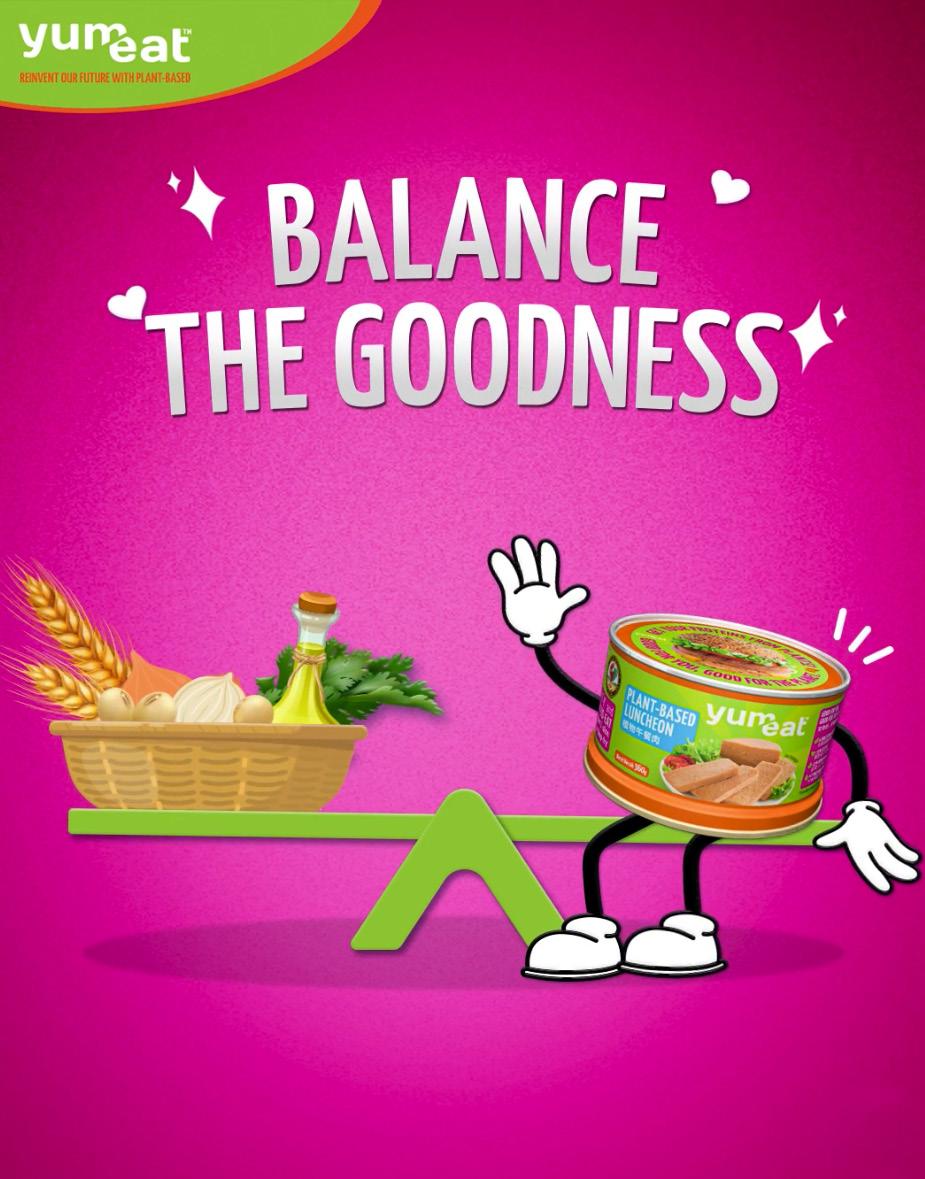
United Nations Global Compact
Denis Asia Pacific Pte Ltd has been a member of U.N. Global Compact, Network Singapore, since January 1st 2016.
A reliable company’s value system and a principled approach to doing business.
Corporate sustainability starts with a company’s value system and a principled approach to doing business. This means operating in ways that, as a minimum, meet fundamental responsibilities in the areas of human rights, labour, the environment and anti-corruption. Responsible businesses enact the same values and principles wherever they have a presence, and know that good practices in one area do not offset harm in another. By incorporating the Ten Principles of the UN Global Compact into strategies, policies and procedures, and establishing a culture of integrity, companies are not only upholding their basic responsibilities to people and planet, but also setting the stage for long-term sustainable development and success.
Denis Asia Pacific Pte Ltd has therefore pledged to incorporate the 10 Principles of United Nation Global Compact in its company governance and to live by these.
P u b l i c a t i o n 0 6Y e a r 2 0 2 2 25
They are divided into four main topics:
Human Rights
Principle 1: Businesses should support and respect the protection of internationally proclaimed human rights; and
Principle 2: make sure that they are not complicit in human rights abuses.
Labour
Principle 3: Businesses should uphold the freedom of association and the effective recognition of the right to collective bargaining;
Principle 4: the elimination of all forms of forced and compulsory labour;
Principle 5: the effective abolition of child labour; and
Principle 6: the elimination of discrimination in respect of employment and occupation.
Environment
Principle 7: Businesses should support a precautionary approach to environmental challenges;
Principle 8: undertake initiatives to promote greater environmental responsibility; and
Principle 9: encourage the development and diffusion of environmentally friendly technologies.
D e n i s A s i a P a c i f c P t e L t dE . S . G . R e p o r t 26
Anti-Corruption
Principle 10: Businesses should work against corruption in all its forms, including extortion and bribery.
There has been a particular focus on Principle 10 since 2020 with an emphatic tone from the top on anti-corruption. In 2021 and 2022, we developed and launched a programme of anti-corruption e-training, which is mandatory for all office staff. The e-training is validated by a test and an e-certifcate given on completion.
Denis Asia Pacifc has also pledged to publish a yearly ESG report to openly monitor the company’s progress.
The scope of our ESG Master Plan continuously enlarged.
The scope was originally inclusive of (1) Denis Asia Pacifc Pte Ltd, (2) all companies in which Denis Asia Pacifc Pte Ltd is in a position of control in having a majority of shares and (2) SFI Supply Management Pte Ltd (a sister holding company of Denis Asia Pacifc Pte Ltd.) and its subsidiaries.
SFI works closely and uniquely for Denis Asia Pacifc Pte Ltd.
Denis Asia Pacifc shareholders decided therefore that SFI and the companies controlled by this holding should be integrated into the sustainability journey and form part of the ESG report.
P u b l i c a t i o n 0 6Y e a r 2 0 2 2 27
In 2019, we decided to enlarge our scope to another holding of the Group, Denis China Co. Ltd which controls the Group business in China, Hong Kong SAR and Macao SAR.
In this ESG report, “DAP” or “the company” should stand for all companies as defned by the above scope.
In 2020, our French distribution company started the certifcation process of “PME+”, a special French ESG scheme for French SMEs. We had planned to be ready in 2021. Due to Covid and other priorities, we had to delay the project. We will give an update on our progress in our next ESG Report. Our objective is to integrate our French distribution company in our ESG Scope once they achieve this certifcation.
The list of companies is published on pages 52 to 55.
Problem-solving strategy
Maison Denis has a 160 year history. It already had strong, established values before joining United Nation Global Compact, Singapore Chapter. Although the company is a medium sized company with international coverage, it had limited scope in terms of management resources which could be devoted to sustainability.
D e n i s A s i a P a c i f c P t e L t dE . S . G . R e p o r t 28
It was therefore sensible and logical to adopt a problem-solving strategy; this consists of identifying the company’s weaknesses with reference to the 10 Principles and working on ad hoc solutions in order to keep what is good, to correct what is found to be wrong and to amend what could be improved.
The company created an ESG committee (refer to page 12). The committee defnes an ESG action plan with three levels of actions:
• 3 long term strategic dates
• DAP is committed to be carbon neutral by 2040.
• DAP is committed to use only recyclable packaging for its production by 2030.
• DAP is committed to have all its buildings ‘green’ certifed by 2030.
• A set of coordinated actions for the coming years
10 main projects or pledges. These pledges, decided by the ESG committee, come with key indicators that are monitored and presented in the ESG report.
At each ESG review, the pledges are individually assessed and upgraded if needed.
P u b l i c a t i o n 0 6Y e a r 2 0 2 2 29
• A selection of 5 Sustainable Development Goals. The SDGs best represent DAP’s ESG efforts and as such they are communicated to all stakeholders to ensure that ESG commitments are fully taken on board by staff and partners alike.
The materiality and the outcomes of the three levels of actions are reported annually in each ESG report.
D e n i s A s i a P a c i f c P t e L t dE . S . G . R e p o r t 30
The 9 pledges results
Last defned in 2021, our 9 pledges demonstrate how ESG performance is deeply embedded in our strategic and operating model. Each department has worked together in the achievement of their tasks. With this 5th report, we are sharing our results in meeting these objectives:
Environment:
(1) Having successfully calculated our Greenhouse Gas (GHG) emissions scope 1 and scope 2, we will now calculate all other indirect emissions that occur in our company’s value chain: scope 3.
Outcomes pages 59 to 61: Scopes 1 and 2 have been calculated by each of our companies since 2020 and published in this report. In 2022, we completed our frst Greenhouse Gas report (Scope 1, 2 and 3) for our activities in Singapore. This will now be rolled out to all the countries in which we operate.
(2) We will continue our efforts towards a zero-carbon economy, by regularly setting ambitious, science-based emission reduction targets.
Outcomes page 62: The frst step before fxing Science Based Targets (SBT) is to fnish calculating our Scope 3 emissions (refer to
P u b l i c a t i o n 0 6Y e a r 2 0 2 2 31
objective (1)). In the meantime, work continues on the reduction of our Scope 1 and 2 emissions.
(3) We will continue with Life-Cycle Assessments of our products to identify and reduce, when possible, the main contributors to their environmental impact.
Outcomes page 62: To date, we have completed the Life Cycle Assessment (LCA) of 3 of our main product ranges. The results clearly showed us where to focus our attention to reduce our impact. This work will continue in 2023 with 2 other product ranges.
(4) We will maintain our efforts in paper reduction and aim to reduce our current usage by 10% in 2022-2023.
Outcomes pages 75 to 77: Our paper consumption stabilized in 2023 after a 26% decrease in 2022. Increased efforts will be required to achieve 10% additional reduction by 2024.
(5) We will continue to improve the sustainability of our supply chain.
Outcomes pages 87 to 99: We maintained 100% usage of sustainable palm oil in 2022 in our production. In terms of our tuna supply, we maintained our target of 100% healthy biomass catch areas for skipjack and yellowfn tuna.
D e n i s A s i a P a c i f c P t e L t dE . S . G . R e p o r t 32
In 2022 we also introduced full traceability of our products from vessel to supermarket comprising vessel name, catch area, production codes and distribution tracking.
(6) We will continue to increase consumer confdence by constantly improving our products and safe processes such as the use of BPAfree linings, X-Ray, heavy-metal controls, radioactivity controls, etc.
Outcomes pages 120 to 124: we performed all quality controls to our satisfaction. However, 2022 was a complicated year for our targets of BPA-free cans. As a consequence of COVID, a shortage in the supply of cans forced us to produce 578,545 cartons of canned sardines and mackerel with non-BPANI cans. The situation was back to normal in 2023.
Social:
(7) We will continue to set and improve KPIs for our employees, with a specifc focus on gender equity.
Outcomes page 106: With a remarkable 66% overall fgure in gender equity, DAP remains only 3% short in management of having full gender equity for all categories of staff.
(8) We will take actions to improve the safety and well-being of
P u b l i c a t i o n 0 6Y e a r 2 0 2 2 33
our staff, especially with the start of the retroftting of Mafpro’s factories.
Outcomes pages 88 and 108 to 110: The retroftting project is progressing as per our schedule. Meanwhile, the number of occupational accidents in 2022 signifcantly reduced by 28%, and the number of days lost due to occupational accidents also reduced by 5% compared to 2021.
Governance:
(9) The management team has decided to emphasise awareness and best practice amongst all employees in the fght against corruption and bribery.
Outcomes pages 140 to 142: By the time of the 2022 report publication, executives and managers in all companies under the scope of DAP’s ESG (except in two markets, Vietnam and China, delayed due to translation issues) had completed anti-corruption e-learning programmes, validated by a test. 40% of workers completed anti-corruption training & pledges in 2022. The remaining 60% will complete these in the coming months.
In 2023, specifc advanced training will be organized for exposed staff.
D e n i s A s i a P a c i f c P t e L t dE . S . G . R e p o r t 34
The Group’s improved ESG strategy
Since 2016, our active and successful ESG strategy has resulted in a signifcant improvement in our understanding of our commitments and vision. For a better acceptance and appropriation of our ESG strategy by all our stakeholders and especially our staff, we wish to remain clear, pragmatic, specifc and efficient.
Our strategy is now defned in three levels
- 3 long term goals
- 10 short and medium term pledges
- 5 Sustainable Development Goals
The 3 long term strategic goals
The 3 milestones defned by our shareholders give a clear idea of what the Group seeks to achieve.
2040: Global Carbon Neutrality
DAP has an ambitious commitment to contribute to carbon neutrality in our activities by 2030, extending to the entire supply chain by 2040.
As per the Paris Agreement, we state today that we will participate in the global effort to achieve carbon neutrality by the middle of the century.
P u b l i c a t i o n 0 6Y e a r 2 0 2 2 35
To reach this objective:
- we will reduce our CO2 emissions of fossil fuel origin;
- we will help to reduce the CO2 emissions of other partners in our supply chain;
- and we will contribute to the increase in global removal, by participating in the development of carbon sinks.
2030: Green Building certification.
Buildings have extensive direct and indirect impacts on the environment. During their construction, occupancy, renovation, repurposing and demolition, buildings use energy, water and raw materials, generate waste, and emit potentially harmful atmospheric emissions. These facts have prompted the creation of Green Building standards, certifcation, and rating systems aimed at mitigating the impact of buildings on the natural environment through sustainable design.
Since our frst ESG Report, we have pledged that all buildings and facilities belonging to DAP will achieve Green Building certifcation by 2030.
We have already made considerable progress towards this goal, certifying 30 % of our existing buildings.
D e n i s A s i a P a c i f c P t e L t dE . S . G . R e p o r t 36
2030: Full packaging recyclability.
We have specifcally identifed the recyclability of packaging in our activities as one of our main ambitions to fully contribute to a circular economy; We therefore now pledge to have all our packaging recyclable by 2030. This challenging objective calls for action. We have classifed all our packaging and identifed some materials which are harder to recycle, such as pouches. We are experiencing challenges in developing solutions for retortable packaging specifcally. We are therefore exploring alternative solutions, mostly from mono-materials or greener materials. This recyclability commitment is enhanced by ongoing improvements to save on the quantity of material packaging necessary to safely protect food products.
The 10 short and medium term pledges
We strive to continuously improve our processes and set ambitious new targets. The new report includes the continuation of existing and new pledges. Classifed by category, our 10 pledges are:
Environment:
(1) Having successfully calculated our Greenhouse Gas (GHG) emissions scope 1 and scope 2, we will now calculate all other indirect emissions that occur in our company’s value chain: scope 3.
P u b l i c a t i o n 0 6Y e a r 2 0 2 2 37
(2) We will continue with Life-Cycle Assessments of our products to identify and reduce, when possible, the main contributors to their environmental impact.
(3) We will continue to reduce the amount of paper we use.
(4) We will continue to improve the sustainability of our supply chain.
(5) We will continue to increase consumer confdence by constantly improving our products and making processes safer such as through the use of BPA-free linings, X-Ray, heavy-metal controls, radioactivity controls etc.
Social:
(6) We will continue to set and improve KPIs for our employees, with a specifc focus on gender equity.
(7) We will continue to take action to improve the safety and wellbeing of our staff, especially with the start of the retroftting of Mafpro’s factories.
(8) We will continue our efforts to engage our staff in ESG as part of their daily working lives and have them participate and contribute to ESG initiatives.
D e n i s A s i a P a c i f c P t e L t dE . S . G . R e p o r t 38
Governance:
(9) The management team has decided to emphasize awareness and best practice amongst all employees in the fght against corruption and bribery.
(10) In 2023, we will start updating our governance policies.
The 5 Sustainable Development Goals (SDG)
In 2020, the United Nations complemented the 10 principles by the implementation of 17 sustainable development goals. DAP selected 5 goals to be incorporated into its company vision. These 5 goals meet specifc ESG strategic commitments of the Group. Their clear and recognizable logos will help us to communicate our ESG strategy to all our stakeholders.
Goal 5: Achieve gender equality and empower all women and girls
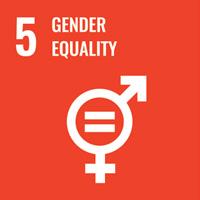
Target 5.5: Ensure women’s full and effective participation and equal opportunities for leadership at all levels of decision making in political, economic and public life.
Goal 9: Build resilient infrastructure, promote sustainable industrialization and foster innovation
Target 9.4: upgrade infrastructure and retroft
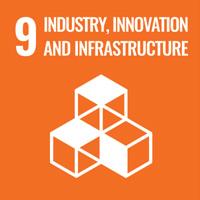
P u b l i c a t i o n 0 6Y e a r 2 0 2 2 39
industries to make them sustainable, with increased resource-use efficiency and greater adoption of clean and environmentally sound technologies and industrial processes, with all countries taking action in accordance with their respective capabilities.
Goal 12: Ensure sustainable consumption and production patterns

Target 12.6: Encourage companies, especially large and transnational companies, to adopt sustainable practices and to integrate sustainability information into their reporting cycle.
Goal 14: Conserve and sustainably use the oceans, seas and marine resources

Target 14.4: effectively regulate harvesting and end overfshing, illegal, unreported and unregulated fshing and destructive fshing practices. Implement science-based management plans, in order to restore fsh stocks in the shortest time feasible, at least to levels that can produce maximum sustainable yield as determined by their biological characteristics.
Goal 15: Sustainably manage forests, combat desertification, halt and reverse land degradation, halt biodiversity loss
Target 15.2: promote the implementation of sustainable management of all types of forests, halt deforestation, restore degraded forests and substantially increase afforestation and reforestation globally.

D e n i s A s i a P a c i f c P t e L t dE . S . G . R e p o r t 40

About this report
This is our sixth sustainability report. The report covers our governance, social and environmental performance for the year 2022.
Since 2021, our ESG reports have been produced per calendar year, and our aim is to publish them within the frst two months of the following year.
An ESG committee at the highest level of management
We have constituted an Environment, Social and Governance committee (ESG committee) at the highest level of management. The committee is chaired by Mr. Daniel Denis, Maison Denis’ Vice Chairman. Mr. Nicolas Denis, Maison Denis’ Chairman, and Mr. Fabien Reyjal, CEO, are the vice-chairmen of the committee. It demonstrates the high level of commitment to the durability and sustainability of the business model by the family owning the companies since 1862.
The Group Marketing Director, Mr. Hervé Simon, acts as the coordinator of the ESG committee.
The ESG committee also includes the Group Procurement & Supply Chain Director, Mr. Jean-Philippe Lamy, the Industrial Operations Director, Mr. Jimmy Yeung, the Group Quality Director, Mr. Stéphane Stanislas, the Group R&D Director, Mrs. Natalie Yap, the Group Compliance Coordinator, Mr. Chong Teck Pin, the Senior Digital Manager, Mr. Guillaume Virantin, the ESG Manager, Mr. Pablo Merino,
D e n i s A s i a P a c i f c P t e L t dE . S . G . R e p o r t 42
the Regional Human Resources Manager, Mrs. Serena Lee, the Group Strategy & Process Manager, Ms. Veronica and the Group Senior Finance Manager, Mrs. Kerina Kwek.
The ESG committee, assisted when needed by external experts, reviews and determines the context, scope, boundary and prioritization of the ESG projects.
The ESG committee meets every four months. It decides on the ESG projects, it designates the senior director or manager in charge for each project, sets the key indicators and it monitors progress.
Materiality assessment
ESG project prioritisation is not done with a matrix system or a ranking. Denis Asia Pacifc Pte Ltd is a medium sized company with a collaborative work process and a flat hierarchy. Therefore, the management is well connected with the wider organization, with a deep knowledge of the materiality of the priorities.
These priorities are defned, listed, reviewed and upgraded (when possible) every year. Each specifc action is under the responsibility of the relevant director and member of the ESG committee, with responsibility for the implementation within the defned timeframe.
This organization has proven itself to be particularly efficient for the frst fve ESG action plans.
P u b l i c a t i o n 0 6Y e a r 2 0 2 2 43
Accuracy of data
We rely on our internal procedures to verify the accuracy of data and information provided in this report.
As we are not a public listed company, the ESG committee freely decides the context, scope and boundary of the company ESG report, but any information in the ESG report is shared with accurate, relevant data in full transparency and honesty.
If a project fails to reach its key indicator at the time of the ESG report, the provisional data will be provided with an explanation of the difficulties encountered in the completion of the task.
Availability of the report
The ESG report is to be published within 2 months after the closing of the data collection period.
The ESG report is available to anybody without limitation.
For a wider reach, our ESG website uses Google neural translation which allows for the report to be available in 14 languages on the website MaisonGroupEsg.com. As automatic translation may come with errors, it is important to note that legally the only valid version is the English text.
D e n i s A s i a P a c i f c P t e L t dE . S . G . R e p o r t 44
For inclusion purposes, the English version has been equipped since 2022 with an audio format for visually impaired persons.
For sustainability reasons, the ESG report is available only in digital format. It can be downloaded in pdf from most of our companies’ websites, including “Denis.com” and “MaisonGroupEsg.com”.
It is also available for consultation and download on: https://issuu.com/denisbrands.
As a member of United Nations Global Compact, Singapore Chapter, the ESG report is also published as a Communication on Progress (CoP) on the UN Global Compact website: www.unglobalcompact.org
Feedback & contact
The ESG committee considers it a duty to answer any question which is relevant and not frivolous about our ESG report, but it will entertain only written questions addressed by email (Contact Us) or by post to:
ESG committee
Denis Asia Pacifc Pte Ltd
Denis Building
21 Tagore Lane
Singapore 787479
P u b l i c a t i o n 0 6Y e a r 2 0 2 2 45
data 2018 - 2022
D e n i s A s i a P a c i f c P t e L t dE . S . G . R e p o r t 46
environmental
ESG SCORECARD 2018 2019 20201 2021 2022 Greenhouse Gas emissions Scope 1 (tCO2e)* * * 6,449 6,656 7,889 Greenhouse Gas emissions Scope 2 (tCO2e)* * * 5,467 5,387 5,678 Grid Electricity consumption (MWh) 9,337 8,599 8,912 8,827 9,362 Solar electricity generation (MWh) 696 1,811 1,771 1,726 1,713 Natural gas consumption (mmBtu) 68,596 70,011 80,212 80,249 93,947 Coal (lignite & bituminous) consumption (tons) 1,033 998 802 712 1,026 Water consumption (m3) 385,662 409,291 450,659 465,479 538,691 Water discharged after treatment (m3) 284,721 295,586 347,844 359,887 414,446 Normal waste to recycling/reusing (tons) 2,886 2,791 4,119 4,639 5,472 Normal waste to landfll (tons) 434 452 388 322 319 Percentage of waste Recycled, Reused or Valorized 87% 86% 91% 94% 94% Hazardous Waste generation (tons) 1.6 2.0 2.0 1.5 1.6 Paper consumption (tons) 10.4 10.1 8.9 6.6 6.6 Packaging materials used (tons) 6,553 6,556 7,848 6,728 7,569 Percentage of recyclable primary packaging (in weight) 99.7% 99.7% 99.7%
ESG Scorecard
social data 2018 - 2022
* Historical data can change following the availability and update of emissions factors. Refer to the figure in previous ESG reports, calculated on energy usages only.
1 From 2020, addition of China in the scope.
2 Excluding probation period and fixed-term contract.
P u b l i c a t i o n 0 6Y e a r 2 0 2 2 47
ESG SCORECARD 2018 2019 20201 2021 2022 Employees 1,645 1,668 1,656 1,653 1,835 Percentage of female employees 67% 68% 67% 64% 66% Employee turnover rate (permanent2 staff) 9% 10% 9% 14% 19% Average training hours per employee 12.9 12.3 9.4 6.3 11.8 Medical leave days 11,609 11,682 10,639 11,369 14,417 Occupational accidents 34 29 34 29 21 Injury days from occupational accidents 697 408 189 276 263 Road Accidents (commuting) 25 28 22 18 12 Injury days from road accidents 787 842 428 760 670 Fatality from road accidents 0 1 0 1 1
About Denis Asia Pacific
Our History
Maison Denis has a fascinating 160-year history. The vision, mission, solid values, and business principles provide the foundations for this exceptional longevity. The descendants of Etienne Denis are still at the helm of the businesses.
Denis gets its strength and stability from three different sectors, in which the Denis companies are able to achieve and maintain a high level of professionalism, paired with a historically innovative spirit: food & beverages, health sciences, and consumer goods distribution.
This ESG report covers the food & beverages activity which started in 1954 when Denis took over the A. Clouet company in Malaya with its main food business: Ayam Brand. Ayam Brand, founded in 1892 in Singapore by Mr Alfred Clouet, became an international brand distributed in more than 30 markets on three continents and is ranked today 520th consumer brand in Asia (Asia’s Top 1000 Brands 2021, Nielsen). The food & beverages activity is directed by Denis Asia Pacifc Pte Ltd, which serves as an operational headquarters for Denis, regrouping most of the functional services, including ESG.
To cater for the expansion of its food business, Denis invested heavily in production and logistics. The main production & logistics site is in Taiping, Perak in West Malaysia. It employs more than 1000 staff. The Mafpro site consists of three factories and produces mainly canned
D e n i s A s i a P a c i f c P t e L t dE . S . G . R e p o r t 48
fsh. The Guinea Foods factory cans fsh and sauces. Guinea Foods consists of two factories to meet the growing demand for sauces. Taiping is also an important logistics base for the Group with two large warehouses and cold-room sites: SFI phase 1 and SFI phase 2.
Alce Nero and Maison Denis formed a joint venture in 2004 to promote and distribute Alce Nero, a leading Italian organic food brand, throughout Asia.
In 2017, Maison Denis opened a new manufacturing site near to Ho Chi Minh in Vietnam, with the aim of distributing its food brands in the Greater Mekong region.
In 2020, DAP invested into Sophies’BioNutrients, a Singaporebased food-tech company using microalgae and patent pending technologies to develop 100% plant-based & sustainable alternative protein for the food industry.
In 2021, after two years of experimental R&D, DAP launched Yumeat™, a new direction addressing a growing demand for plantbased alternatives that are healthier for humans, safer for animals, and better for the planet.
In 2022, DAP invested in Reeli Pte Ltd, a next generation plant-based seafood and dairy foods company.
P u b l i c a t i o n 0 6Y e a r 2 0 2 2 49
Our vision of the future
Denis is well positioned to beneft from the key trends that are expected to shape our future markets, namely:
• continued urbanization combined with greater connectivity that requires convenient, safe, healthy and cross-cultural food.
• pursuit of investment in the understanding of better health through good nutrition, clean food, and better hygiene.
• the pleasure of food discoveries and of creating moments of reunion and surprise for family and friends centered around food; we see this as a key preoccupation across the world.
We see many opportunities for Maison Denis in the coming years:
• the opportunity to make our brands truly global by reaching more consumers worldwide.
• the opportunity to develop new & innovative segments such as ready-to-eat meals, frozen foods, foods on-the-go and foodservice solutions that better address the needs of new consumers.
• the opportunity to promote the cultivation, manufacturing and use of organic & natural foods in the region.
D e n i s A s i a P a c i f c P t e L t dE . S . G . R e p o r t 50
• the opportunity to develop and promote the use of plant-based alternatives with the objective to become more environmentally impactful.
• the new opportunities that will be brought about by the next big wave of massive investment in infrastructure in ASEAN in the next 10 years.
• and the opportunity to grow a sustainable food supply model with a concern for waste, nutrition and stability and with substantial social impact in society as we envisage it tomorrow.
P u b l i c a t i o n 0 6Y e a r 2 0 2 2 51
D e n i s A s i a P a c i f c P t e L t dE . S . G . R e p o r t 52 Our companies Singapore Holding 21 Tagore Lane Tel: +65 6459 8133 Denis Asia Pacific Pte Ltd Singapore 787479 Fax: +65 6459 2867 Companies controlled by this holding: Australia A. Clouet (Australia) Pty. Ltd. 11 Melissa Place Tel: +61 2 8814 8086 Kings Park, NSW 2148 Fax: +61 2 9678 9508 Indonesia PT. Faretina Jl. Radin Inten II Tel: +62 21 8690 0868 No. 8, Duren Sawit Fax: +62 21 8690 1336 Jakarta 13440 Malaysia A. Clouet & Co (KL) Sdn .Bhd. 19 Persiaran Sabak Bernam Tel: +60 3 5191 1069 Section 26, 40400 Shah Alam Fax: +60 3 5191 1988 Selangor Darul Ehsan Malaysia D.D.M Sdn Bhd. 19 Persiaran Sabak Bernam Tel: +60 3 5191 1069 Section 26, 40400 Shah Alam Fax: +60 3 5191 1988 Selangor Darul Ehsan
P u b l i c a t i o n 0 6Y e a r 2 0 2 2 53 Malaysia Mafpro Sdn. Bhd. Jalan Perusahaan Tiga Tel: +605-8912704 Kamunting Industrial Estate Fax: +605-8913919 34600 Taiping, Perak Malaysia Guinea Foods Sdn. Bhd. Jalan Lintasan Perusahaan Tel: 05-8911899 Kamunting 3, Kamunting Raya Fax: 05-8912899 34600 Taiping, Perak. Singapore Clouet Trading Pte. Ltd. 21 Tagore Lane Tel: +65 6459 8133 Singapore 787479 Fax: +65 6459 2867 Thailand The Commercial 1168/3-4, 2nd Floor Tel: + 66 2 285 6858 Company of Siam Ltd. Lumpini Tower Fax: + 66 2 285 6830 Rama IV Road, Bangkok 10120 Vietnam Denis G.M. Co Ltd Lot 17-4, Singapore Tech Park Tel: +84 274 357 9798 Ben Cat Town, Binh Duong Fax: +84 274 357 9799 Province, Vietnam
D e n i s A s i a P a c i f c P t e L t dE . S . G . R e p o r t 54 Singapore Holding 21 Tagore Lane Tel: +65 6459 8133 SFI Supply Management Singapore 787479 Fax: +65 6459 2867 Pte Ltd Companies controlled by this holding: Malaysia SFI Food Sdn Bhd. PT 32730, Jalan Logam 5 Tel: +60 5891 8704 Kawasan Perusahaan Fax: +60 5891 3919 Kamunting Raya 34600 Taiping, Perak Mexico BAHIA GDE S. DE RL DE C.V RFC BGD 070802 TCA Mision de Mulege 2910 1D – Zona urbana Rio Tijuana TIJUANA BC 22010 MEXICO China Holding Flat A-5, 11/F, Cheung Lung Tel: +852-25265986 Denis China Co. Ltd. Industrial Building Fax: +852-28450538 10 Cheung Yee Street Cheung Sha Wan Kowloon, Hong Kong S.A.R.
Companies controlled by this holding:
China
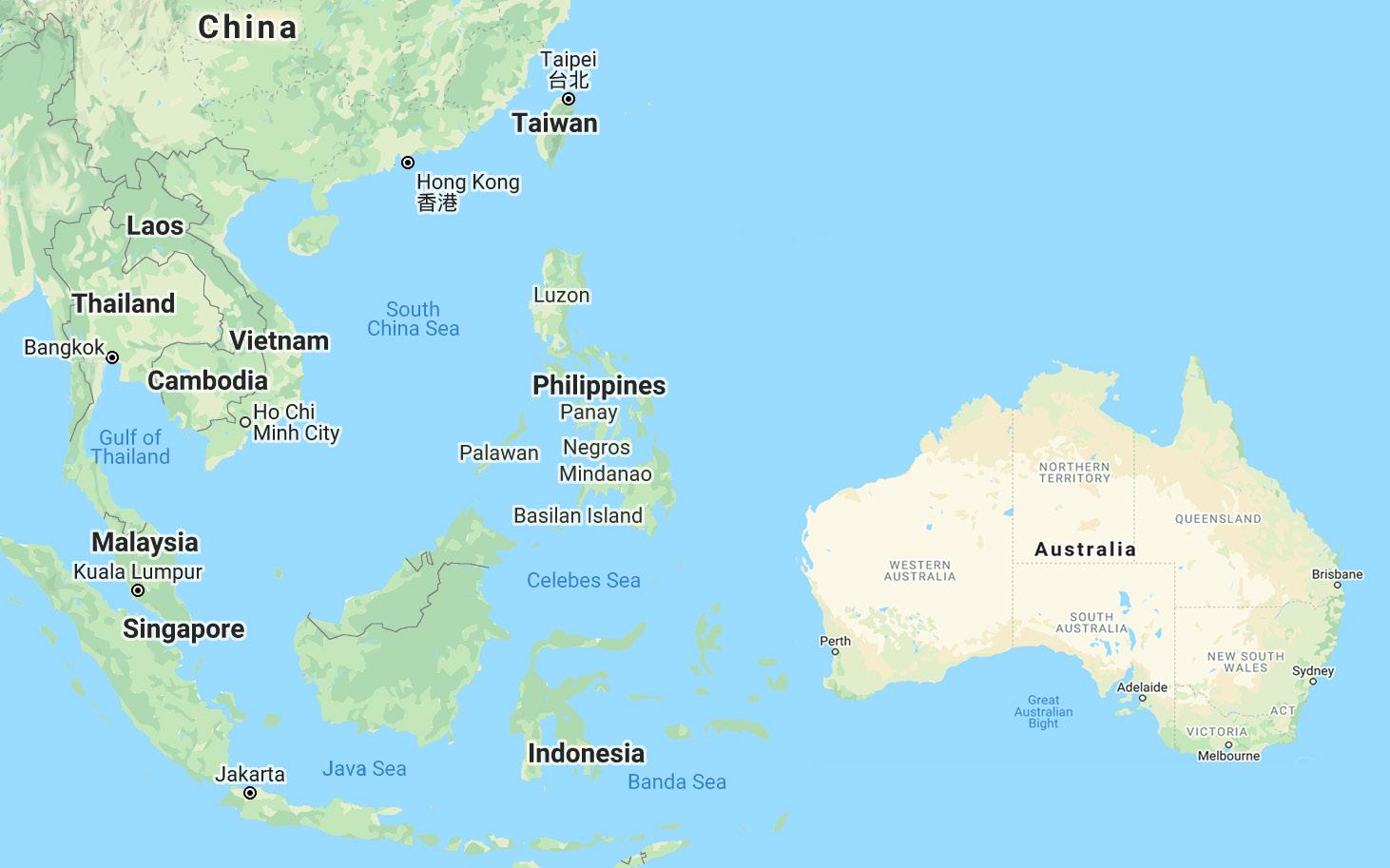
P u b l i c a t i o n 0 6Y e a r 2 0 2 2 55
Denis Freres (Shenzhen) Unit #605A, 6/F Tel: +86 755 8282 2103 Co. Ltd. International Chamber of Fax: +86 755 8255 7340 Commerce Center, No.168 Fuhua 3rd Road
District, Shenzhen
China
Code: 518048 Office Factory Warehouse
Futian
Guangdong,
Postal

Easy peasy pies with yumeat™ plant-based minced meat.

D e n i s A s i a P a c i f c P t e L t dE . S . G . R e p o r t 58 Environment
Carbon Neutrality
DAP has an ambitious commitment to become carbon neutral in its activities by 2030 (also called scope 1 & 2), and, in a second step, in its entire supply chain by 2040 (scope 1, 2 and 3 combined).
The effort required to achieve carbon neutrality is unprecedented. We are committed to mobilize all necessary resources to combat climate change in our domain. We will share our progress annually in the ESG report.
Greenhouse Gas (GHG) Report
The GHG Protocol Corporate Standard classifies a company’s GHG emissions into three ‘scopes’.
- Scope 1 emissions are direct emissions from owned or controlled sources.
- Scope 2 emissions are indirect emissions from the generation of purchased energy.
- Scope 3 emissions are all indirect emissions (not included in scope 2) that occur in the value chain of the reporting company, including both upstream and downstream emissions.
P u b l i c a t i o n 0 6Y e a r 2 0 2 2 59 GHG emissions
SCOPE 1 SCOPE 2
We have calculated our corporate direct and indirect emissions from scope 1 and 2:
TOTAL SCOPE 1
Purchased electricity
TOTAL SCOPE 2
TOTAL (Scope 1 + 2)
Our Scope 1 and 2 Greenhouse Gas emissions represent a total of 13,567 tons of CO2 equivalent in 2022.
48 % of these emissions come from Stationary Combustion (boilers) and 42 % from electricity. The remaining share is split 7 % from fugitive emissions (refrigerant gas) and 3 % from mobile combustion (transport).
Since last year, our Scope 1 and 2 emissions have increased by 13%. However, within the same period, our GHG intensity (tCO2e /
Finished product) reduced by 4%.
D e n i s A s i a P a c i f c P t e L t dE . S . G . R e p o r t 60
Manufacture Malaysia Fugitive emissions Refrigerant Gas 666 224 5,010 5,900 4,446 4,446 10 28 1,514 1,552 844 844 226 211437 388 388 903 463 6,523 7,889 5,678 5,678 10,346 2,396 825 Mobile Combustion Company Vehicles
Combustion Boilers
t
Stationary
Manufacture Vietnam O ces (Asia-Pacific) Total Emissions 13,567 2022 GHG emissions (tCO2e)
Providing food to the world is our mission. This is an essential activity and we’re now doing it more efficiently in terms of carbon impact. We generate (scope 1 and 2) 0.53 tCO2e in producing 1 ton of fnished goods.
This is the result of several energy optimization projects conducted over the last 2 years (refer to the chapter “Energy Optimization” pages 64 to 67).
This ratio is a key indicator which demonstrates the improvements made in our factories to achieve more energy efficient processes.
P u b l i c a t i o n 0 6Y e a r 2 0 2 2 61
(Scope 1) Stationary Combustion (Scope 1) Mobile Combustion (Scope 2) Purchased Electricity (Scope 1) Fugitive emissions GHG emissions (tCO2e) 16,000 14,000 12,000 10,000 8,000 6,000 4,000 2,000 2020 2021 2022 (Scope 1) Stationary Combustion (Scope 1) Mobile Combustion (Scope 1) Purchased Electricity (Scope 1) Fugitive emissions GHG emissions (tCO2e) GHG intensity (tCO2e/tProduct) Intensity (tCO2e/tProduct) 3,500 0.00 0.20 0.40 0.60 0.80 1.00 7,000 10,500 14,500 17,500 2020 2021 2022
Scope 3 emissions
We recognise that our action on Scope 1 and 2 is only the frst step in our decarbonization journey. We intend to expand our efforts to the entire added value chain of our activities. We are currently calculating our Scope 3 emissions, in order to better understand them and prioritise our actions. For this difficult task, we have partnered with Greenly, a French company that helps us to calculate, understand and reduce our emissions. We have run a pilot project with our distribution office in Singapore. The result is positive: in a few months, we obtained a GHG Report that highlights the key impacts of our activities.
We will now deploy this solution with all our companies under the scope of this ESG Report, with the objective of obtaining a full GHG Report (scope 1, 2 and 3) by the end of 2023.
In parallel, we are working on the LCAs (Life Cycle Assessments) of our main ranges of products. It is long and tedious work that should take us a few years. But it will serve two purposes: a better understanding of our GHG emissions at our product level, and a view of the overall environmental impact of our products, on a larger scope than only Climate Change. So far, we have completed the LCA on canned sardines and mackerel, coconut in cans, and coconut in brick. However, for coconut products, we will need to perform
D e n i s A s i a P a c i f c P t e L t dE . S . G . R e p o r t 62
additional audits as today’s databases do not properly measure the type of plantations we are sourcing from.
Once this task is complete, we will create our carbon neutrality strategy, with the aim of defining ScienceBased Targets.
P u b l i c a t i o n 0 6Y e a r 2 0 2 2 63
Energy optimization
A first step in fighting Climate Change is to reduce our greenhouse gas emissions. To achieve that, we are taking initiatives to make our processes more efficient. We are not just working for the present but investing in the future.
By combining several technologies and exploring multi-angle strategies, we aim to reduce our electricity consumption and the quantity of fossil fuel used to produce steam in our production sites in Malaysia and Vietnam.
Our main production sites in Malaysia have been equipped with electricity meters (all wireless, connected to the Cloud), coupled to specifc EMIS (Energy Monitoring Information System) software. This gives us live, detailed visualisation of our sites’ power consumption. Identifying our main load users has allowed us to prioritize our projects and focus our efforts and investments on the equipment that matters.
The most signifcant source of GHG emissions within our operations is from the manufacturing stage of our activities where electricity and fossil fuel are consumed. Our team has implemented energy savings projects that, all combined, have saved 700 tons of CO2e annually as highlighted in the table below:
D e n i s A s i a P a c i f c P t e L t dE . S . G . R e p o r t 64
272 tCO2e
Optimisation of boiler operations’ running time to be continually coordinated with production schedule.
58 tCO2e Rearrangement of process line schedule to optimize production.
43 tCO2e Replacement of Wastewater Treatment Plant (WWTP) dewatering system, Filter Press with Multi-Disc Screw Press.
18 tCO2e
Usage of air conditioners with inverters that continuously regulate the surrounding temperature by controlling the compressor motor’s speed.
9 tCO2e
Change of the WWTP blower operating hours while ensuring the dissolved oxygen generation for the biological treatment is sufficient.
185 tCO2e
Process improvement: creation of cooling pool to lower product temperatures after retorting, improving production efficiency.
P u b l i c a t i o n 0 6Y e a r 2 0 2 2 65
56 tCO2e
Installation of temperature control valves for main users of steam, for efficient heating.
41 tCO2e Change of mercury lamps into LED lights.
12 tCO2e
Installation of a digital timer on disinfection UV lights to control operation time.
6 tCO2e
Reduced number of journeys of the lorry travelling between factories by consolidating deliveries.
In addition to these projects conducted in 2020 and 2021, three other major actions were implemented in 2022, contributing a saving of an additional 76 t of CO2e:
1. Audit and retroftting of our steam traps, to ensure they are correctly sized, ftted to the piping and operational. Subsequent to this improvement, we also strengthened our control of the steam traps by conducting formal monthly inspections. This will help us to maintain these savings in the long term. This global review process is fully operational in our Malaysian Manufacturing sites and has now been rolled out in our Vietnamese factory.
Savings calculation: 50 tCO2e saved per year.
D e n i s A s i a P a c i f c P t e L t dE . S . G . R e p o r t 66
Savings calculation: 17 tCO2e saved per year.
Savings calculation: 9 tCO2e saved per year.
We also conducted a Thermal Energy Audit of our Malaysian factories in 2022, which gave us an overall picture of the remaining opportunities for saving steam in our processes. Given the positive outcomes of this audit, we have decided to conduct a similar Energy Audit in our Vietnamese manufacturing plants in 2023.
P u b l i c a t i o n 0 6Y e a r 2 0 2 2 67
2. Replacement of defective air-conditioners with new models with inverters.
3. Replacement of our WWTP surface aerator with a new more energy efficient model.
Solar Energy
Electricity is still mainly produced from fossil fuels. Electricity from Solar PV panels accounts for only 3.7% worldwide. We believe this share should be higher despite obvious limitations such as weather conditions and limited daily availability. Solar PV panels are now an affordable and efficient way to act pragmatically on climate change. We considered them to provide a way for us to signifcantly reduce greenhouse gas emissions from our processing plants.
Our Solar PV system in Malaysia
Since 2018, our main industrial and logistics buildings in Taiping, Malaysia, have been equipped with rooftop Solar panels. These generated around 1,700,000 kWh of electricity in 2022, saving the emission of 1,000 tons of CO2e every year. This is equivalent to the carbon emissions captured by a forest of 45,000 trees. This project benefts from a PPA (Power Purchase Agreement), signed with our Solar partner. This type of contract was a great opportunity for us to access cheaper energy costs from the start without up-front investment. 20 forthcoming years of fxed prices will allow us to improve our production cost control. At the end of the 20-year lease, we will own the system and enjoy “free” electricity for the Taiping site.
D e n i s A s i a P a c i f c P t e L t dE . S . G . R e p o r t 68
New Solar project in Vietnam
Given the excellent outcomes of our frst solar project and the expertise gathered by our team, we aim to continue increasing our share of renewable energy, taking further advantage of the improved technology.
With the ramp-up of production in our Vietnamese facility, a solar system became appropriate. After conducting the necessary studies, at the end of 2022 we signed a new Solar Investment deal to install 700 solar panels on the rooftop of our factory. This new solar system has a capacity of 381.5 kWp and should generate 500,000

P u b l i c a t i o n 0 6Y e a r 2 0 2 2 69
Watch the video of our solar system at this link: Solar System Taiping
kWh of electricity per year, approximately half of our electricity consumption in Vietnam. This should save around 400 tons of CO2e annually, equivalent to the carbon emissions captured by a forest of 19,000 trees.
For this project, we decided to invest directly using CAPEX. This represents a signifcant investment for our Vietnamese factory but is in line with our vision of the future and our carbon neutral strategy.
D e n i s A s i a P a c i f c P t e L t dE . S . G . R e p o r t 70

Resource Management
Resources are limited, precious, fragile and need to be managed. We aim to use them with caution, to recycle, to reuse, to substitute … all this in order to protect our environment and to conserve our natural resources.
Water
In 2022, DAP consumed 538,691 cubic meters of water. The increased fgure is linked to an increase in our production output and the upkeep of COVID-19 prevention measures. We still clean all our common areas and our processing rooms 3 times a day, to avoid cross contamination between our employees. In addition, we sanitize our production areas frequently with a specifc disinfectant, that needs to be rinsed before restarting production. Nevertheless, we continue to monitor water consumption as we simultaneously work on improving water-efficiency.
D e n i s A s i a P a c i f c P t e L t dE . S . G . R e p o r t 72
600,000 500,000 400,000 300,000 200,000 100,000 2020 2019 2018 Water consumption (m3) 2021 2022 O MV MM (O: Offices, MV: Manufacturing Vietnam, MM: Manufacturing Malaysia)
To ensure that discharged water is fully treated before dispensing it into the environment, every single one of our factories is equipped with a Waste Water Treatment Plant (WWTP). The water discharged consistently complies with national rejection standards.
Waste
In 2022, our manufacturing sites generated 5,791 tons of Normal Waste (packaging, rejected products, WWTP sludge, scrap-metal …) 94% of this waste is diverted from landfll, going to facilities able to give it a second life by being reused, recycled or valorised.
(MV: Manufacturing Vietnam, MM: Manufacturing Malaysia)
P u b l i c a t i o n 0 6Y e a r 2 0 2 2 73
7,000 6,000 5,000 4,000 3,000 2,000 1,000 2020 2019 2018 Normal Waste generation (tons) 2021 2022 MV MM
Hazardous waste (defnition: any waste that could have potential threats to public health or the environment without proper handling) represents only 1.6 tons, which comprises oil, batteries, solvents, paints, chemicals etc. This is monitored, stored and managed by qualifed employees and collected and treated by authorized contractors.
The fluctuations in waste generation mainly reflect our incoming materials and our activities. Despite our favouring purchases with fewer packaging materials, this still presents a challenge for many suppliers.
We audit our waste treatment centres regularly to ensure our waste is treated properly, and that we only work with those treatment centres that fulfll their obligations and demonstrate effective
D e n i s A s i a P a c i f c P t e L t dE . S . G . R e p o r t 74
7 6 5 4 3 2 1 2020 2019 2018 Hazardous Waste generation (tons) 2021 2022 MV MM (MV: Manufacturing Vietnam, MM: Manufacturing Malaysia)
control of their environmental impact.
Our audit criteria are straightforward: the best practices in terms of Environment, Health and Safety (EHS) will be rewarded with higher scores. This is how we choose between suppliers. Nonetheless, to avoid neglecting minor entities with a limited grasp of this concept, we also consider and recognize their commitment and progress. We have now audited all our waste collectors and we will continue to do so regularly.
Paper
In 2022, DAP consumed 6,574 kg of Paper, a similar amount compared to the previous year. The impact of COVID-19 has accelerated the digitalization of several administrative processes. Since 2020 every company has had to handle work from home and out of necessity, we have had to fnd solutions. Many new ways of working and handling documents were implemented as a consequence. Those practices have continued since staff have returned to office premises, explaining our lower levels of paper consumption.
P u b l i c a t i o n 0 6Y e a r 2 0 2 2 75
D e n i s A s i a P a c i f c P t e L t dE . S . G . R e p o r t 76 12,000 10,000 8,000 6,000 4,000 2,000 2020 2019 2018 Paper usage (kg) 2021 2022 O MV MM (O: Offices, MV: Manufacturing Vietnam, MM: Manufacturing Malaysia)
In addition, we have ensured that all paper purchased comes from sustainable sources, thanks to FSC or PEFC certifcation.
The Forest Stewardship Council (FSC) and the Programme for the Endorsement of Forest Certifcation (PEFC) are organizations that certify forest products, like paper and wood, as being sourced in an environmentally friendly, socially responsible and economically viable manner.
We mentioned in our previous report that we will maintain our objective to reduce our paper consumption over the next 2 years by 10%. With increased activity, we are satisfed to have stabilized our consumption at the same level as last year, after a 26% decrease. We will now work harder to make the necessary improvements in 2023 to reduce the amount of paper used in our offices.
P u b l i c a t i o n 0 6Y e a r 2 0 2 2 77
Better Packaging
2030 Packaging Recyclability Objective
We are committed to make a year-on-year difference as we believe in the importance of combining business success with an aligned mindset for green initiatives and responsible sourcing.
We pledge that all our packaging will be recyclable by 2030. This challenging objective calls for action. Our progress to date: we have classifed the packaging that we use and singled out those categories of packaging which are hard to recycle, such as the pouches. We are working on a solution for these using a mono-material or greener material, with the added challenge that it must be retortable. We anticipate this initiative will provide a long-term sustainable impact.
Packaging in Singapore
DAP has been a signatory of the Singapore Packaging Agreement since 2018 and won a Merit Award in 2019 for its efforts made in reducing the quantity of packaging material used in its products (refer to page 21). The Singapore Packaging Agreement ended in June 2020 and has been replaced by the Packaging Partnership Program (PPP). The PPP is a joint capability development program between Singapore NEA and Singapore Manufacturing Federation (SMF), that supports companies with new obligations under the Mandatory Packaging Reporting (MPR) system which started on 1 January 2021. PPP also provides a platform to exchange best
D e n i s A s i a P a c i f c P t e L t dE . S . G . R e p o r t 78
practice in sustainable packaging waste management whilst enabling networking with various industrial groups within SMF.
We successfully submitted our frst packaging report under the Singapore Mandatory Packaging Reporting for the year 2021. This packaging reporting covers all specifed packaging used on regulated goods supplied to Singapore. We have also developed and submitted two 3R (Reduce, Reuse, Recycle) plans focusing on:
• Weight reduction of carton packaging used to contain our product;
• An increase in the use of recycled content in our carton packaging.
Packaging Reporting and 3R plans are mandatory and require an annual submission and update on our progress.
Packaging improvements
Below are the improvements we implemented in 2022 to reduce the environmental impact of our packaging:
• PET caps: we replaced PVC with PET materials, which are more recyclable. This change impacts 26,000 individual caps.

P u b l i c a t i o n 0 6Y e a r 2 0 2 2 79
• Stretch-flm (Hand roll): We have reduced flm thickness from 23µm to 17µm, resulting in a reduction of 2,250kg of plastic usage per year. Moreover, this Stretch-flm LLDPE is recyclable.

• Slip Sheets: To transport our products, we switched from wooden pallets to slip sheets made of kraft paper. Per container, 20 individual pallets are substituted with slip sheets. With this, we not only eliminate 480 kg of waste disposal but also save more resources and energy used in pallet production. Incorporating slip sheets into our supply chain whenever applicable improves the sustainability of tertiary packaging.

• Opp Tape is used to seal our pallets and cartons before transportation. Changing the tape thickness to 50 microns has contributed to a packaging weight reduction estimated at around 2,500 kg per year.

D e n i s A s i a P a c i f c P t e L t dE . S . G . R e p o r t 80
• Edge Protectors: we use a paper-based edge protector made of corrugated paper-board (waste produced in manufacturing) to protect goods from damage during transport and storage. It is made of 100% recycled materials and is in turn easily recyclable.

• Pouches: while continuing to work with our partners on recyclable retort pouches, we have taken the decision to pack our sauce, paste and soup products in light-weight pouches. This change results in a light weight 240 kg per year of primary packaging.
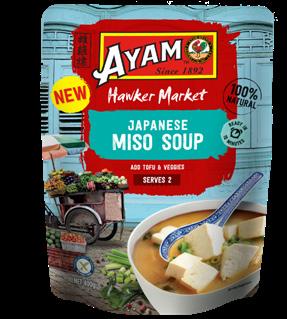
Every little effort counts; each bit of progress will add up to create immense value and every improvement will contribute to a sustainable future. We are proud of our packaging achievements, but there is still more to do.
By 2030 all our packaging will be recyclable. We are displaying this commitment on our company logo and our efforts will focus on this objective over the next few years.
P u b l i c a t i o n 0 6Y e a r 2 0 2 2 81
Environmental Certification
Our ESG efforts are also measured via environmental certification.
ISO 14001
ISO 14001:2015 specifes the requirements for an environmental management system that an organization can use to enhance its environmental performance. It is intended for use by an organization seeking to manage its environmental responsibilities in a systematic manner that contributes to the environmental pillar of sustainability.
The Group’s desire to obtain such certifcation came from the core commitment that we must ensure proper control of our environmental impact.
For several years now, all our plants have been operating under ISO 14001 certifcation:
- Mafpro Sdn Bhd, Malaysia Certifed since 2013
- Guinea Foods Sdn Bhd, Malaysia Certifed since 2013
- SFI Food Sdn Bhd, Malaysia Certifed since 2018
- Denis G.M. Co Ltd, Vietnam Certifed since 2019
Efforts made by the teams to ensure certifcation requirements are met annually have been a clear demonstration of the responsibility we feel towards the environment.
D e n i s A s i a P a c i f c P t e L t dE . S . G . R e p o r t 82
Green Buildings
Buildings have extensive direct and indirect impacts on the environment. During their construction, occupancy, renovation, repurposing and demolition, buildings use energy, water, and raw materials, generate waste, and emit potentially harmful atmospheric emissions. These facts have prompted the creation of Green Building standards, certifcation, and rating systems aimed at mitigating the impact of buildings on the natural environment through sustainable design.
As pledged in 2016, all DAP buildings will be Green Building certifed by 2030. We are continually working on this promise to ensure it materialises by the target date. Here is our progress so far:
- Singapore office (Singapore) GreenMark certifed since 2017
- Kuala Lumpur office (Malaysia) GreenRE bronze certifed since 2019
- Taiping (Malaysia) logistics GreenRE silver certifed centers (2 buildings) since 2019.
- Taiping (Malaysia), factory, GreenRE bronze certifed Guinea Foods 2 since 2022.
P u b l i c a t i o n 0 6Y e a r 2 0 2 2 83
In 2022 we achieved a new certifcation for one of our manufacturing buildings in Taiping, Malaysia. This follows the same GreenRE industrial standard as both of our logistics centers. They were the frst two buildings in Malaysia to receive this certifcation.
We have, since 2020, been working towards the certifcation of our office and warehouse in Sydney, Australia. We are using the “GreenStar– Performance” frame of reference, which is widely used in Australia and recognized by the World Green Building Council.
We were initially targeting certifcation of this building by 2021. However, we faced some delays in Australia, partly due to the COVID pandemic. We are now targeting 2023.
A major retroftting of our factories is in progress in Taiping (refer to the Chapter Taiping Manufacturing Master Plan pages 88 to 89). We have already registered the project under the GreenRE Green Building Scheme for industrial buildings. The project team is now integrating the requirements from the design phase of the project. The main challenge is to optimize our thermodynamic needs, by studying how to reuse each element of the process. We aim to have a highly efficient cooling system, with all the other classic features of a Green Building: natural ventilation, LED lighting, waste segregation, good indoor air quality etc.
D e n i s A s i a P a c i f c P t e L t dE . S . G . R e p o r t 84
We expect this large-scale retroftting to have multiple positive impacts on ESG such as the reduction of GHG, improved staff safety and comfort, waste reduction and energy savings.
Testimony from our partner companies
StarkMedia Limited
In 2022, Singapore-based Stark Media and Maison Denis entered a Joint-venture where Maison Denis put their trust and faith into Stark Media, supporting the young but experienced Digital Media & Creative agency with not only funds but resources such as distribution channels and networks.
With the driven team led by its co-founders, Desmond Pang & Cyrus Chung, and Maison Denis’ support, Stark Media has grown progressively, providing services such as content creation, social media management, graphics design, live-streaming, and video production to their clients. They even became an official partner of TikTok Shop. Some prominent clients include Safra, Saihing Medical, Invade SG, Gain City, MCCY, Yumeat, and more.
The Maison Denis’ values and ESG commitments were contributing to Stark Media’s decision to have such a partner as a shareholder and mentor.
P u b l i c a t i o n 0 6Y e a r 2 0 2 2 85

Supply chain sustainability
We believe that, for a Fast-Moving Consumer Goods business like ours, the sustainability of the supply chain is key to the durability of the business model and to the company’s ethics.
As an established centennial company, DAP benefts from a heritage of solid values. But, with an internationally renowned brand portfolio, DAP has also to check that its suppliers adhere in turn to its ethics and that they do not participate in unsuitable and/or illegal activities or ventures that could taint the reputation of the company and of its brands.
In 2017 DAP implemented a «Supplier Code of Conduct” to which all our suppliers should adhere. It can be downloaded from this link: “Supplier Code of Conduct”. From experience, we recognize that some of our suppliers have more demanding Codes of Conduct than our document. Therefore, from 2022, our partners can either sign our Supplier Code of Conduct or provide us with a copy of their Internal Code if it matches or exceeds our expectations.
In our supply chain, our utmost priority is safety. As we are revamping our main factory (Taiping Manufacturing Master Plan Project), we are constructing the plan of this major renovation through the flters and demands of our ESG ambitions. As far as DAP’s direct supply chain is concerned, our Ethics Committee has identifed two issues, sensitive to consumers, NGOs and public opinion: Sustainability of tuna
P u b l i c a t i o n 0 6Y e a r 2 0 2 2 87
supplies and palm oil. These two topics have therefore been put top of the list of our priorities.
Taiping Manufacturing Master Plan
The detail design study of the planned Centralized Fish Processing Plant (CFPP) was much more challenging than we expected. Additional studies were needed to ensure the process flow. Our plan in terms of superfcies was correct and eventually we were able to confrm the blueprint, a key element in the preparation of the tender document.
We set up a team of experts to work on processes and specifcally a Project Manager to help us coordinate and progress the work during the multiple tests and experiments. A key role of the Project Manager is to ensure effective communication with the architect, “Royal Haskoning DHV”.
The HVAC control system for the cold and chill requirement represents a large proportion of the total CFPP investment. We therefore commissioned a consultant to help review proposals and solutions and to ensure we receive the best offer adapted to our needs.
We have entered the tender document negotiation phase and we
D e n i s A s i a P a c i f c P t e L t dE . S . G . R e p o r t 88
expect the CFPP project to start after Chinese New Year 2023.
CAPEX is still ongoing, and it will be used in phases following the progress of the refurbishment of one of our existing factories.
Concurrently, the team is already working on the second and third phases of the master plan for Taiping which plans to bring automation, energy saving, better safety and improved wellness for our employees.
Sustainability of our tuna supply
Even though DAP’s tuna business represents less than 0.1% of the yearly world tuna catch, the company is committed to being a brand that stands for quality and acts with responsibility by taking a strong stand for sustainable fsh sourcing, compliant fshing, and manufacturing practices.
We do not have a direct relationship with tuna fshing vessels as we work with fsh canning factories, which produce our recipes to our specifcations, and under our quality control. Our area of influence is in the purchasing specifcations we provide to the canned tuna manufacturers.
The use of stringent tuna purchasing specifcations that require sustainable fsh sourcing is our way of putting pressure on the tuna
P u b l i c a t i o n 0 6Y e a r 2 0 2 2 89
fshing industry to make progress not only on sustainable tuna fshing but also on fair and compliant labour practices.
Manufacturers who have been selected to produce for DAP must accept our sustainability specifcations. Our sustainability specifcations cover three main categories:
(1) The biomass
According to the International Seafood Sustainability Foundation (https://www.iss-foundation.org/), globally, 65% of the 23 major commercial tuna stocks are at healthy levels of abundance, 22% are at an intermediate level, and 13% are overfshed.
DAP only uses tuna species which are not endangered and from biomass that is healthy (not at an intermediate level and not overfshed).
Data on the biomass situation is assessed by Regional Fisheries Management Organizations (RFMO), international intergovernmental organizations dedicated to the sustainable management of fshery resources in international waters. We follow the Indian Ocean Tuna Commission (IOTC/iota.org) and the Western and Central Pacifc Fisheries Commission (WCPFC/www.wcpfc.int) in particular. Most of their data is published by ISSF (International Seafood Sustainability Foundation).
D e n i s A s i a P a c i f c P t e L t dE . S . G . R e p o r t 90
DAP therefore only sources three species of tuna:
•
Skipjack tuna (KATSUWONUS PELAMIS)
Most of our canned tuna is produced using skipjack tuna. The skipjack tuna used by our brands is caught in the Pacifc Ocean, in areas assessed by WCPFC as not overfshed, but they could come from any other fshing area where skipjack tuna resources are healthy (not overfshed) as assessed by RFMOs.
In the year 2022, 100% of our skipjack tuna was sourced in line with this sustainability specification.
•
Yellowfin tuna (THUNNUS ALBACARES)
DAP uses yellowfn tuna for canned tuna in oil or in water. In some parts of the world, yellowfn tuna is overfshed. Our requirement is that yellowfn tuna for our brands is fshed from the Western Pacifc, which is assessed as not overfshed by the WCPFC.
In the yearly period 2022, 100% of our yellowfin tuna was sourced in line with this sustainability specification.
•
Tonggol tuna (THUNNUS TONGGOL)
As we may regularly experience several months without any supply from the Western Pacifc, the only solution to maintain this sustainability ratio on yellowfn is to reduce the importance of this species in our production.
P u b l i c a t i o n 0 6Y e a r 2 0 2 2 91
We have therefore managed, in about 40% of our supplies, to replace yellowfn by a lesser-known species called Tonggol. In terms of sustainability balance, such a species presents both a beneft and a drawback. On the plus side, Tonggol is a coastal fsh caught by local small-scale fsheries. This contributes to the local economy, and this type of tuna is not listed as an endangered species. On the downside, these local species of tuna are not used worldwide by the major industries, therefore there is no official monitoring for their biomass by RFMOs.
These local coastal fsheries are however, fully monitored by the canning factory which uses Tonggol raw material for our production. They have to comply with a lot of criteria and are audited every year. The list of requirements comprises:
• Compliance with fshing laws and regulations
• Compliance with human rights and employment laws and regulations
• Full fsh traceability
During the period, 100% of Tonggol was caught in the Western Pacifc.
(2) The Supplier code of conduct
As explained above, DAP works with suppliers who share the same code of conduct for their factories and who, in turn, make this mandatory for their own suppliers.
D e n i s A s i a P a c i f c P t e L t dE . S . G . R e p o r t 92
• Full compliance of labour and social conditions with national laws and international treaties (preventing, amongst other issues, illegal labour and human rights abuses like slavery or child labour).
• No corruption or bribery.
• No tuna supply from illegal, unregulated, and unreported (IUU) fshing.
• No tuna supply from fshing vessels not certifed as Dolphin Friendly or those practising shark fnning or fshing of endangered species.
(3) The recommendations
We play our role in encouraging our suppliers to improve catching methods for skipjack and yellowfn tuna in order to limit bycatch (accidental catch of other species).
Most of our tuna is caught by purse seine fshing vessels and a small percentage from pole and line. We do not accept other methods of catching (like long lines) because of an excessive bycatch rate.
As of today, our suppliers are unable to distinguish between the percentage catch of purse seine on free school tuna versus purse seine on FADs as they are mixed in the fshing vessels. We are, however, in constant dialogue with our suppliers who are committed to collecting data and sharing technical information. This should allow us a better understanding of the situation within a short time frame in order to improve our purchasing specifcations.
P u b l i c a t i o n 0 6Y e a r 2 0 2 2 93
As a company involved in canned fsh, we have on numerous occasions taken the opportunity to express our opinion that Marine Reserves and Marine Protection Areas should be enlarged; additionally, well managed quotas for fsh caught based on scientifc data is an effective tool to manage and to protect fsh resources for future generations. We specifcally express our support to promote the following areas as Marine Reserves and we pledge not to supply fsh from these seas:
• the Antarctic Ross Sea
• Pulau Besar and Merlimau in Melaka, Malaysia
• Port Dickson marine park in Negeri Sembilan, Malaysia
• Pulau Lima in Johor, Malaysia
• Pulau Songsong in Kedah, Malaysia
(4) Data monitoring
We have since 2022 implemented an obligation to monitor data for all our tuna production with six distinct categories:
• Name of species
• Catching area
• Catching method
• Name of vessel
• Production code
• Quantity produced under the above 5 categories.
D e n i s A s i a P a c i f c P t e L t dE . S . G . R e p o r t 94
In collaborating more closely with our suppliers, we are therefore able to trace our tuna all the way from the vessels that fshed them to the retail stores where they are sold.
Sustainable Palm Oil
(1) DAP palm oil policy
DAP has, since 2011, implemented a policy of ‘responsible use’ of palm oil, and, within a few years, reached its target of 100% certifed sustainable palm oil. This policy was combined with a premiumisation of its main brands, replacing basic palm oil wherever technically possible, by an alternative vegetable oil with a healthier nutrient profle, like olive oil for instance.
Despite our extremely low use of palm oil, DAP has nevertheless established and adhered to two stringent standards:
• Palm oil used in any DAP products should be sustainable. Our factories are RSPO certifed and, for our brands, they only source palm oil of West Malaysian origin which is certifed as sustainable. If an OEM client is unwilling to be charged for the extra cost associated with this, we fully bear the cost of the green credits, which are the minimal form of sustainability.
P u b l i c a t i o n 0 6Y e a r 2 0 2 2 95
• DAP product labels should be clear and explicit. When a DAP product contains palm oil, it has to be clearly stated on the ingredient list.
Today, palm oil is present in a very limited number of DAP products and our volume of sustainable refned palm oil purchasing was lower than 95 MT in 2022 for Ayam Brand™ and 108 tons for sustainable crude palm oil in the other brands (including OEM: Original Equipment Manufacturer). Other products derived from palm fruits (like palm fruit puree) account for an additional 577 tons. There is no sustainability scheme planned for palm fruit puree as it is a marginal food item; we monitor its sustainability by keeping a manual record and claim green credits in agreement with RSPO.
(2) Support Asia for Sustainable Palm Oil (SASPO)
DAP is proud to be among the founding members of Singapore Alliance for Sustainable Palm Oil (SASPO), an initiative of WWF Singapore.
(www.wwf.sg/sustainability-circular-economy/sustainable-palm-oil/).
The vision of the Alliance is to make CSPO the norm to stop haze occurring as well as deforestation and animal habitat loss in the region. It aims to provide a platform for companies to come on a sustainability journey towards producing, trading and using certifed sustainable palm oil.
D e n i s A s i a P a c i f c P t e L t dE . S . G . R e p o r t 96
DAP’s palm oil policy proves that it is possible for medium sized companies to develop and implement sustainable and responsible policies. Recent years’ events have demonstrated that it is our duty to participate in all possible efforts to reduce and eventually eliminate haze from our lives.
Whatever their size, all companies should adopt this necessary environmental goal.
Thanks to its palm oil policy, implemented since 2011, DAP has been 100% certifed as sustainable in terms of its palm oil ingredient and palm fruit products since 2020. We have progressed exactly as per our commitments.
• In its 2017 palm oil scorecard report for Malaysia/Singapore based local companies, WWF gave DAP the best score of 10 out of 12 with this comment:
“Leading the way
DENIS ASIA PACIFIC (AYAM BRAND)
SCORE: 10
WWF commends Denis Asia Pacifc for showing strong leadership in regard to the procurement of sustainable palm oil within the Southeast Asia region. Denis Asia Pacifc has demonstrated transparency and commitment to purchase 100 per cent CSPO, is an active member in
P u b l i c a t i o n 0 6Y e a r 2 0 2 2 97
RSPO, a founding member of SASPO and publicly discloses the total volume of palm oil volumes used for each of their brands.
While it has yet to achieve 100% physical CSPO, Denis Asia Pacifc is leading the way for other Singapore-based companies to follow.”
• In 2018, Mr Hervé Simon, coordinator of DAP’s ESG committee, became the elected Chairman of SASPO.
• In June 2018, Mr Daniel Denis, DAP’s ESG committee Chairman, represented SASPO at the Paris Roundtable summit on Sustainable Palm Oil.
• In 2020, DAP received a score of 15.5 out of 22 in the international WWF Palm Oil Buyers Scorecard (https://palmoilscorecard. panda.org/). It is the highest scoring company out of the 16 Asian companies assessed and sits in the top quarter of 173 companies assessed globally. DAP’s strategy has been detailed by WWF in one of its case studies, available on the link above.
• In 2021, DAP ranked second in Asia behind Fraser and Neave, with a score of 14.75 out of 24 in the international WWF Palm Oil Buyers Scorecard (https://palmoilscorecard.panda.org/#/ scores)
D e n i s A s i a P a c i f c P t e L t dE . S . G . R e p o r t 98
• In 2022, SASPO ceased to be organized under a Singaporeregistered company as the fxed costs were consuming too much of its resources and became an informal club of professionals under the Singapore WWF’s supervision. The yearly memberships have been transformed into donations to WWF’s palm oil impact fund.
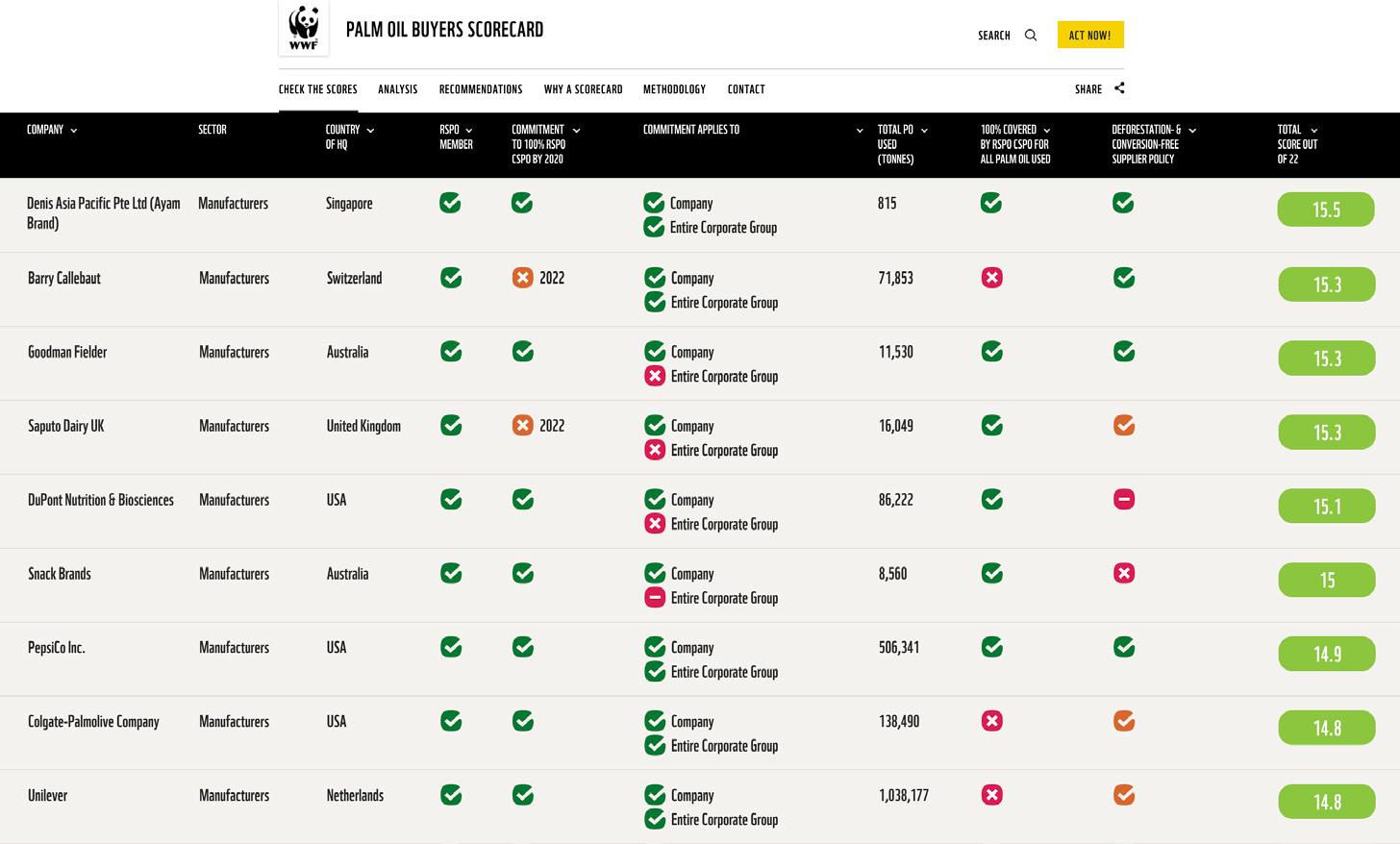
P u b l i c a t i o n 0 6Y e a r 2 0 2 2 99
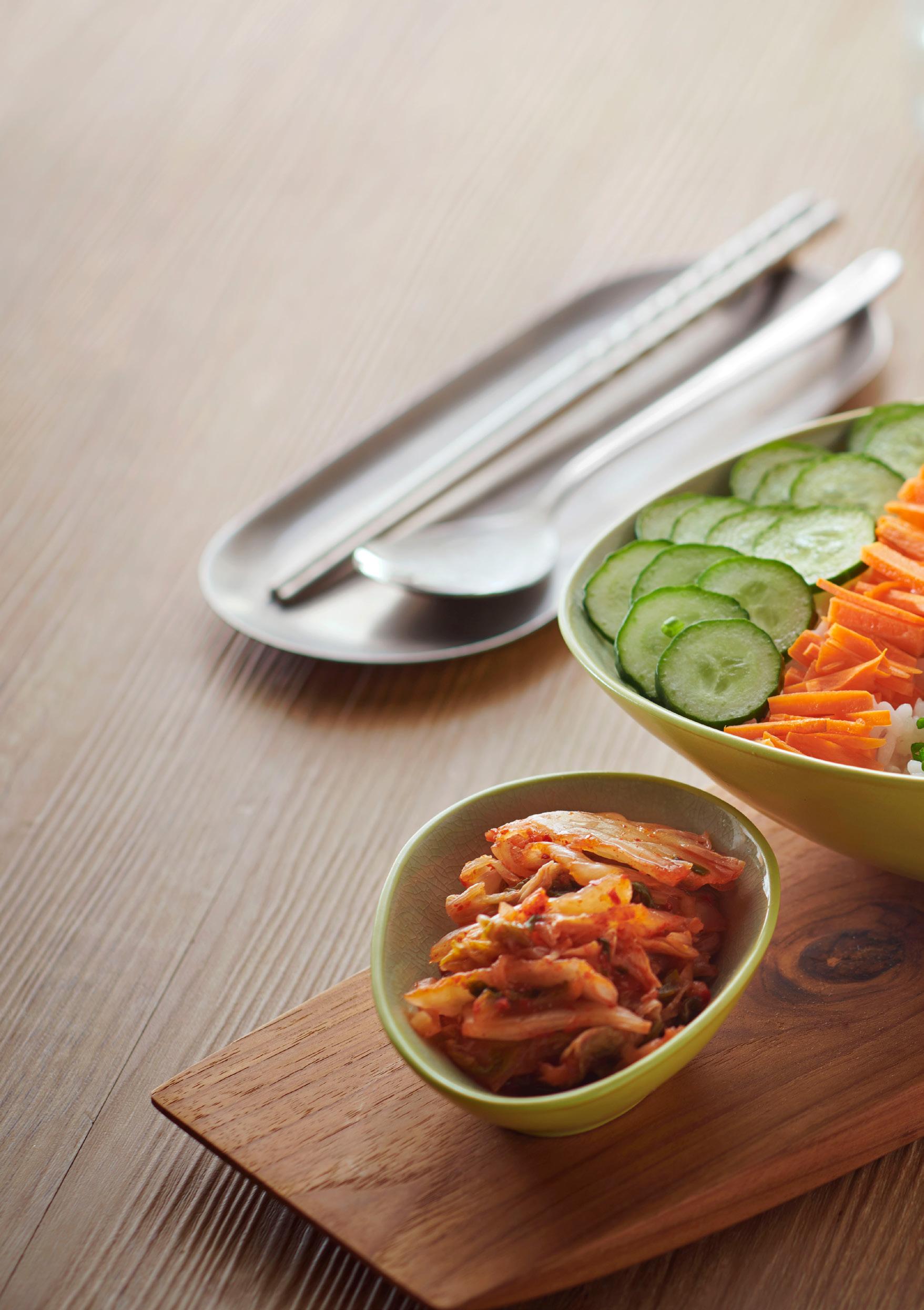
Korean vegetarian bowl with yumeat™ plant-based minced meat.

Social Responsiblity
D e n i s A s i a P a c i f c P t e L t dE . S . G . R e p o r t 102
Our People
DAP’s HR strategy is to attract, motivate, train, and retain quality employees in order to build together with them a profitable, durable and sustainable business model.
Creating value for employees is an important part of our business vision. DAP believes that our employees play the prime role of driving the company and determining its success.
We are committed to building an organization with a respectful and honest environment for our employees, whilst creating value for customers and stakeholders.
Maison Denis achieved the milestone of 160 years in 2022; a year of implementing our new corporate identity. The company has also developed and shared our 6 new principles, namely Perseverance, Quality, Empowerment, Responsibility, Agility and Imagination. We aim to further improve our HR practices by integrating the principles with the processes. We are committed to develop the organization by empowering our employees to better adapt and stay resilient in today’s environment.
P u b l i c a t i o n 0 6Y e a r 2 0 2 2 103
Human Resources
Adding to the post-pandemic difficulties, economics and geopolitics contribute to make the future of many businesses uncertain. Therefore, prioritizing and taking care of employees has become paramount. Health and mental wellbeing of employees has become an HR priority. A few of the entities implemented wellness initiatives in 2022; A.Clouet & Co. (KL) Sdn Bhd rolled out the IDEAL BMI Challenge and a group of employees in Singapore actively participated in the Health Challenge organized by MyKenzen Nutrition Services Pte Ltd. The Company continues with the good practice of providing masks, sanitizers and antigen test kits for its employees. Random antigen testing at 20% is administered weekly for employees working in our manufacturing and warehouse facilities in Taiping.
Re-establishing organizational culture is critical after 2 years of managing and working with COVID. Organizing activities to promote communication, interaction and emotional support is a great way to establish a balanced structure within which to strengthen relationships. Annual Dinner & Dance events were organized in our entities in Malaysia and a team building activity, “Music Jam” was held in Singapore. Employees greatly appreciated the opportunity to come together for interaction.
The commitment to promote diversity, equality and inclusion policies and programs stays strong as we believe this helps to bolster
D e n i s A s i a P a c i f c P t e L t dE . S . G . R e p o r t 104
organizational culture and create an environment that encourages trust, unity, empathy and engagement.
Key figures
At the end of December 2022, DAP staff totalled 1,835 employees; an increase of 11% compared to 2021. The increased headcount is to support the achievement of business objectives. It is company policy to favor the recruitment of permanent staff. We only have 4 part time contracts and the fxed-term contracts apply to less than 5% of our headcount.
70% of our employees are based in Taiping, Malaysia, supporting our manufacturing and warehousing activities.
P u b l i c a t i o n 0 6Y e a r 2 0 2 2 105
2,000 1,800 1,600 1,400 1,200 1,000 800 600 400 200 0 2020 2019 2018 Headcount 2021 2022 Female Male
There is an improvement in the representation of women in our workforce. Women account for 66% which is a 2% increase in comparison to 2021. DAP remains 3% away from a gender balance in Management.
Gender equality
Since the onset of COVID-19, it has been important to create an agile organisation. HR is increasingly playing an integral role in upskilling our employees. DAP provided 21,698 hours of training for the year, approximately twice the number of training hours in comparison to 2021. This represents an average of 12 hours per member of staff. The following chart shows an adequate and equitable distribution of training hours across all categories of employees.
D e n i s A s i a P a c i f c P t e L t dE . S . G . R e p o r t 106
Worker Executive Management 0% 25% 50% 75% 100%
Female Male 68% 62% 53% 32% 38% 47%
We implemented our learning management system “talentLMS” across many entities. Management and executives attended the anticorruption e-learning and cybersecurity training via the easy-to-use online portal. More on-site and external training was implemented in 2022, allowing employees to stay competent in their roles.
Average Training hours
At end December 2022, the yearly number of MC leaves was 14,417 days: an average of 7.8 days per employee. This represents an increase of 1.3 days of MC per employee which is largely due to the contagious Omicron Variant that was spreading widely in 2022.
P u b l i c a t i o n 0 6Y e a r 2 0 2 2 107
30 25 20 15 10 5 0 Management
Executive Worker
Occupational Health and Safety
In 2022, we had 21 occupational accidents and a total of 263 injury days from those accidents. The frequency of accidents has slightly decreased compared to 2021 with 8 fewer. The severity has also slightly decreased (by 5%) compared to the previous year. It is notable that in 2020, the total number of injury days was very low compared to our historical fgures. The challenge in 2021 and 2022 was to maintain this level, and it is good to note that both the number of accident and injury days seems now stabilized at this lower level compared to our historical data. Our aim should however, continue to be
Injury days from OA
D e n i s A s i a P a c i f c P t e L t dE . S . G . R e p o r t 108
a c c i d e n
40 35 30 25 20 15 10 5 0 2020 2019 2018 Occupational Accidents (OA) 2021 2022 800 700 600 500 400 300 200 100 0 2020 2019 2018
zero
t
s b y prevention, investment, proper work processes, empowerment, accident inquiry, and education.
2021 2022
Each accident is investigated to identify its root cause and to implement an action plan. Even if this helps prevent accidents recurring, it is still a lagging indicator: the event has already happened. Hence, we are also monitoring a set of other Health & Safety indicators that are more reflective of our actions.
Inspection is our watchword. By increasing our presence in the feld, we can detect and solve issues before an accident occurs. In 2022, we conducted more than 100 factory walkthroughs in our manufacturing sites. In addition to these weekly walkthroughs, we also inspect our contractors working on-site, to ensure they are complying with the permit to work delivered to them after our safety briefng. Specifc apparatus is also subject to inspection, such as lifting equipment. To facilitate our actions, we are assisted by a software package named Safety Culture. This helps us build our audit checklist, conduct inspections using tablets live in the feld, and automatically generate reports and statistics.
Another notable action in 2022 was the installation of an EHS notice board at the entrance of our factory in Taiping. It displays key EHS indicators and information to our employees, but also to contractors and other visitors. This is a good visual communication tool to make everyone involved in our EHS actions.
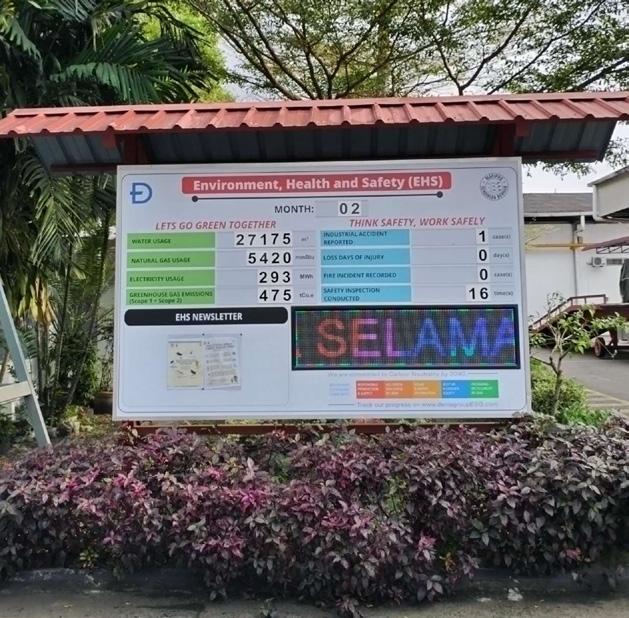
P u b l i c a t i o n 0 6Y e a r 2 0 2 2 109
Road Safety
Commuting accidents (CA)
Concerning road safety, our influence is limited but we try to keep our workers aware of this. The overall number of road accidents in Malaysia is worryingly high and behavioral changes among motorcyclists and youth are a cultural challenge.
In 2022, the number of road accidents while commuting continued to decrease. The commuting accidents resulted in 670 injury days and sadly, one fatality.
D e n i s A s i a P a c i f c P t e L t dE . S . G . R e p o r t 110
30 25 20 15 10 5 0 2020 2019 2018
2021 2022 900 800 700 600 500 400 300 200 100 0 2020 2019 2018
2021 2022
Injury days from CA
MyKenzen
MyKenzen is a nutrition service consulting company developed by Denis Group in Singapore. It helps individuals, corporate entities, government boards, food service and manufacturing industries and the public to promote overall health & well-being.
MyKenzen extends its efforts into promoting health and wellness for the employees of the companies under DAP.
A few examples of these initiatives: In Singapore, employees regularly receive nutrition newsletters. A 6-week health challenge program was crafted with the main health pillars. Hiking trail walks, in-house nutrition talks, mental well-being talks, and an art jamming session were organized to encourage staff to stay on track with their physical activities, nutritional needs, and mental wellness journey.
P u b l i c a t i o n 0 6Y e a r 2 0 2 2 111

ESG is a subject that should be shared and endorsed by all employees in a company whatever their occupation or position. Since the implementation of our United Nations Global Compact membership and our ESG policy, we have been organizing events to raise the environmental awareness of all our employees.
Sustainable Office Competition
We created a yearly Sustainable Office Competition, a platform whereby all our companies in different parts of the world can share best practice in creating a Sustainable Office. The scope of the competition is aligned with our company’s ESG Sustainable Goal Development (SGD) commitments:
Goal 5: Gender Equality
Goal 9: Industry, Innovation and Infrastructure
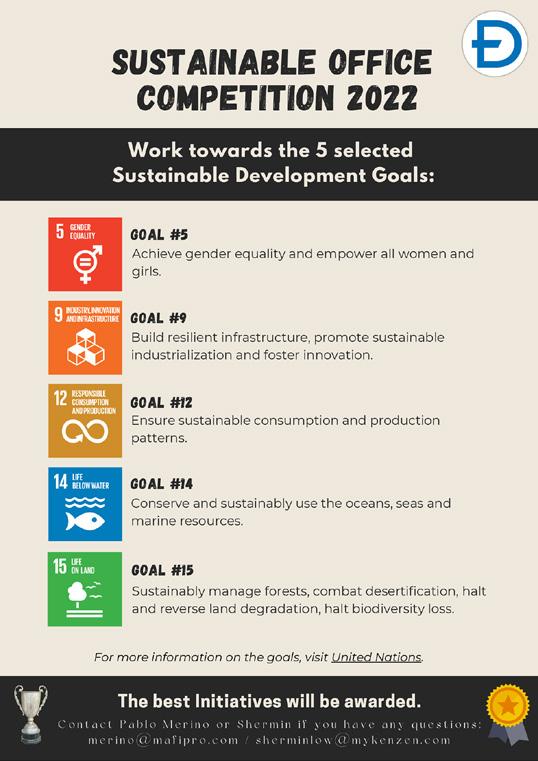
Goal 12: Responsible Consumption and Production
Goal 14: Life Below Water
P u b l i c a t i o n 0 6Y e a r 2 0 2 2 113 Awareness
Goal 15: Life on Land
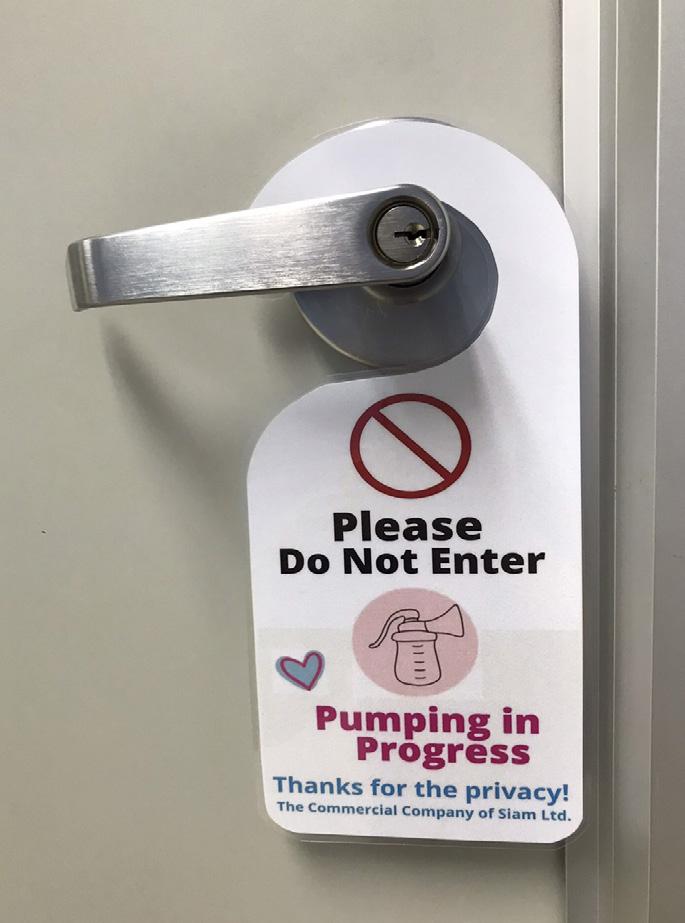
With some elements of fun and a competitive spirit, we have observed excellent engagement and appreciation from the staff.
One of the bestinitiatives in Goal 5 belonged to our Thailand and China teams. They ensured gender equality such as equal employment, progression opportunities, and salary. Additionally, they have encouraged breastfeeding employees in a special way by offering a lactation area and work-life balance through flexible work policies on maternity and childcare leaves.
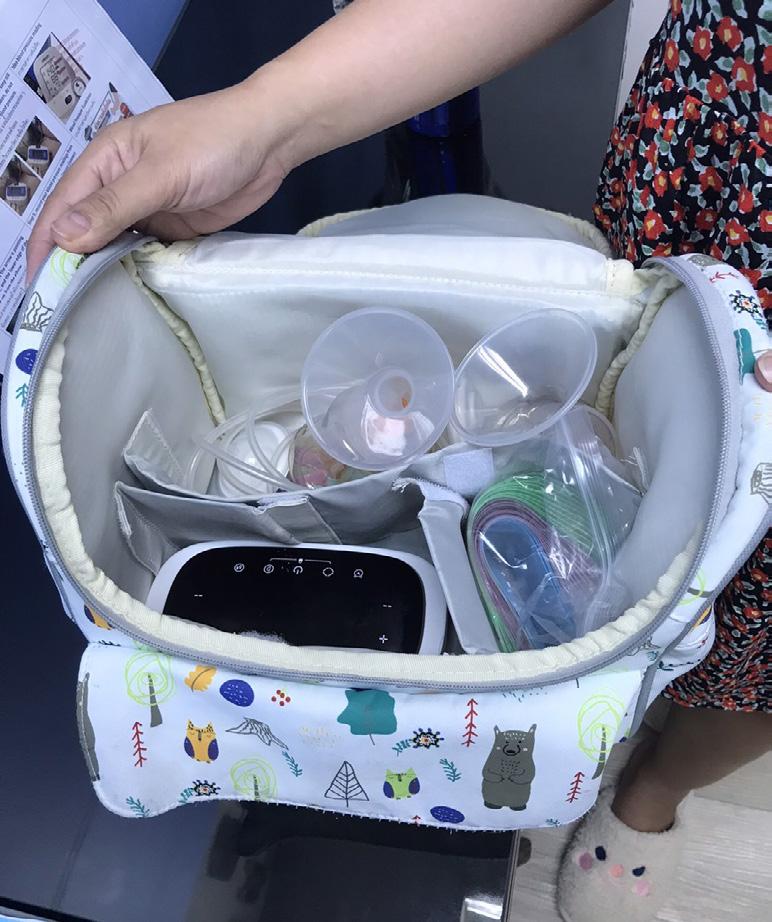
D e n i s A s i a P a c i f c P t e L t dE . S . G . R e p o r t 114
The Vietnam office’s biggest effort toward Goal 12 was conducting the «Denis Chef» contest on Family Day. Employees were required to prepare randomly selected Denis items for their families to help them understand the value of «green and sustainable consumption”. In turn, staff members can convey this important message to consumers to support better consumption patterns.

When celebrating the 130th anniversary of Ayam Brand in Malaysia, our colleagues’ outstanding initiatives included incorporating ESG Goals 12, 14, and 15.
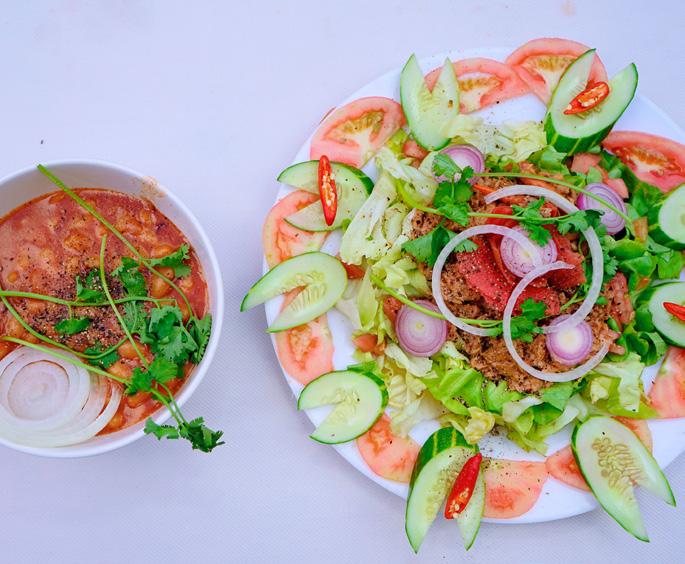
They aimed to «do more and better with less» by reducing resources used and limiting degradation and pollution while enhancing the overall quality of life in accordance with Goal 12 to ensure sustainable consumption and production patterns.
To encourage consumers to recycle useful resources, part of the
P u b l i c a t i o n 0 6Y e a r 2 0 2 2 115
celebration entailed getting consumers to place Ayam Brand cans in the recycling station at the roadshow. The team also arranged for an authorized waste collector to pick up the cans and recycle them, which supports Goal 15’s objective to reduce waste sent to landflls. Additionally, with the goal of reducing singleuse plastic in our daily lives and assisting in the mitigation of plastic pollution in the ocean as part of the green practice journey toward Goal 14, consumers received one Ayam Brand recyclable tote bag for every fve recycled cans.
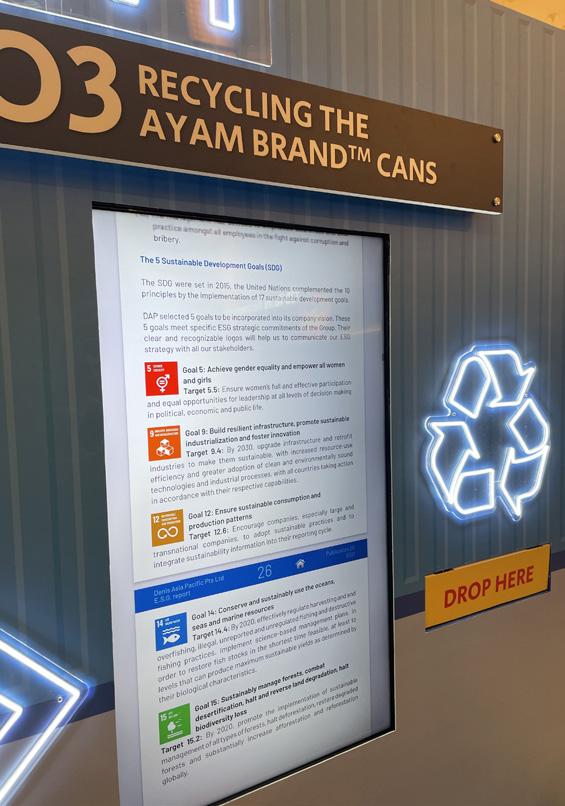
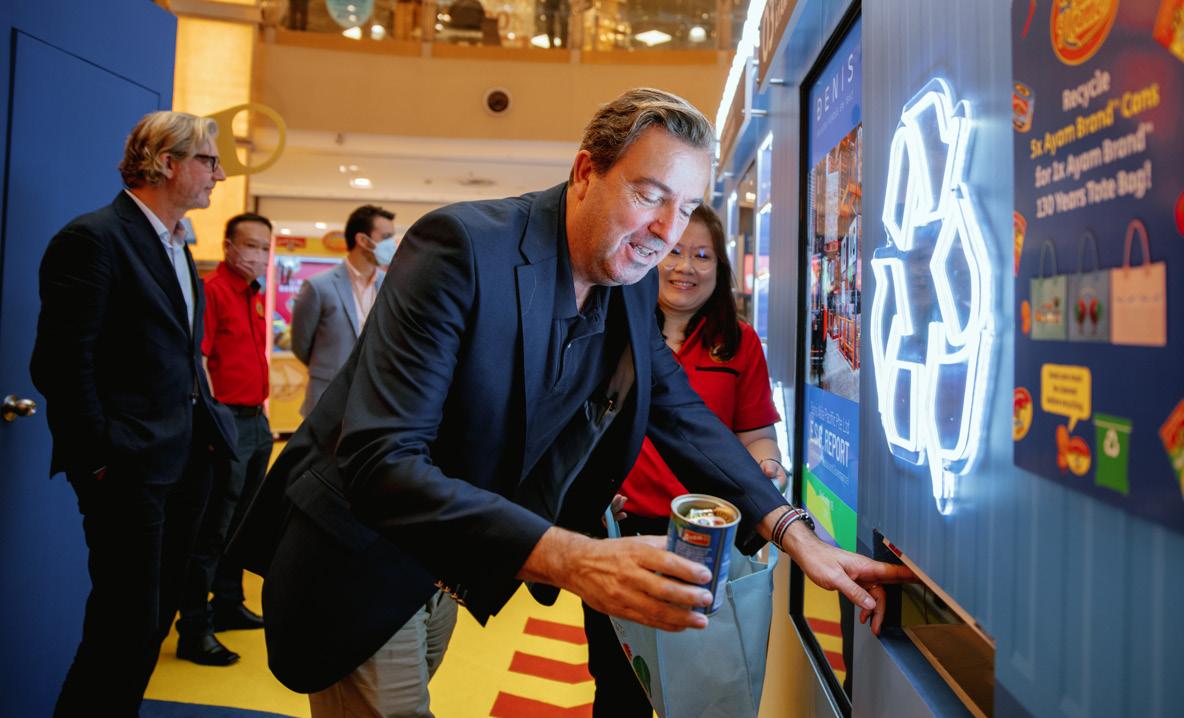
D e n i s A s i a P a c i f c P t e L t dE . S . G . R e p o r t 116
There were many other excellent projects in addition to these top ones, including the following:
Under Goal 9, distribution to many sites in Malaysia has been combined into one delivery using a single carrier for the Northern and Center Regions. General trade consolidation has reduced energy use, greenhouse gas emissions, and shipping costs. The transportation network aids in enhancing the economy and achieving cost savings, as well as helping clients increase resilience and achieve supply chain efficiency with a lower carbon footprint.
Our offices in Thailand, China, Vietnam, and Malaysia participated the most in Goal 12 with a variety of projects. With the aim of encouraging employees to participate in more environmentally friendly activities and to cut down on man-made carbon dioxide emissions—as obesity is linked to higher emissions—the Malaysia office held a BMI challenge. The Thailand office conducted a countstep challenge competition. Furthermore, to raise awareness about upcycling waste into apparel on their family day, the Vietnam team held a «Recycle Fashion» competition.
Finally, the Thailand team also took part in an initiative under Goal 15 that involved planting mangroves.
P u b l i c a t i o n 0 6Y e a r 2 0 2 2 117
Useful and meaningful rewards
To reward those initiatives, the winning offices of the competition received special sustainable gifts such as an office waste composter, air purifer, standing desks, reusable cutlery and food storage bags, a blood pressure machine, ergonomic seats etc.
We also reward employees with the planting of a tree in their name. To do so, we use the online platform Tree-Nation which facilitates the planting of trees in recognized and certifed tree-planting projects around the world. We also use the platform to add to notable events such as Earth Day, to plant trees or reward employees.

In total, since we started using the Tree-Nation platform, we have planted more than 500 trees.
The following photographs demonstrate the effort made by our office teams to spread awareness in a friendly, responsible, and collaborative way.
D e n i s A s i a P a c i f c P t e L t dE . S . G . R e p o r t 118
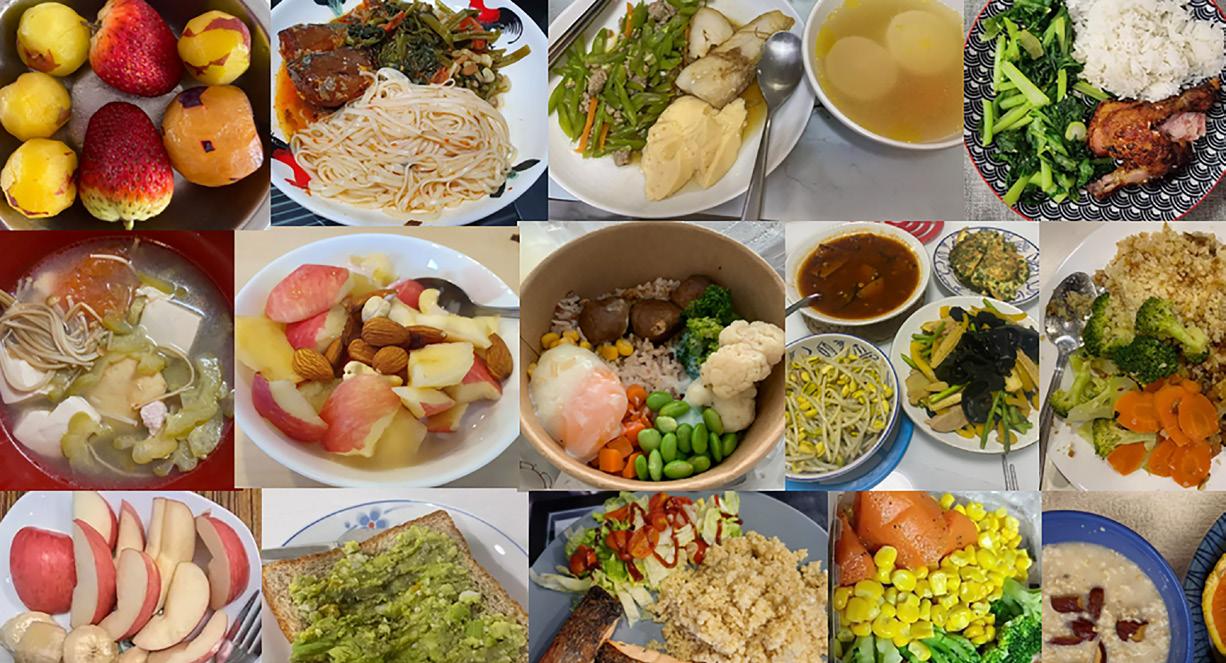
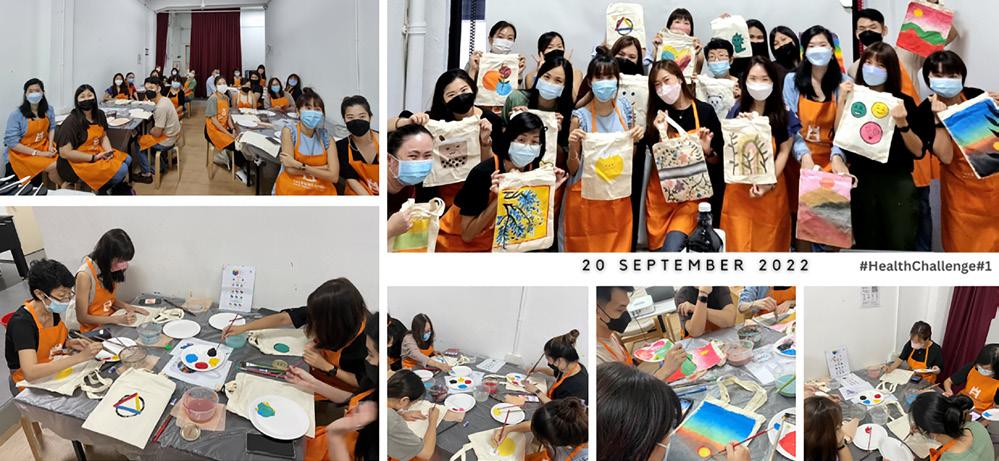
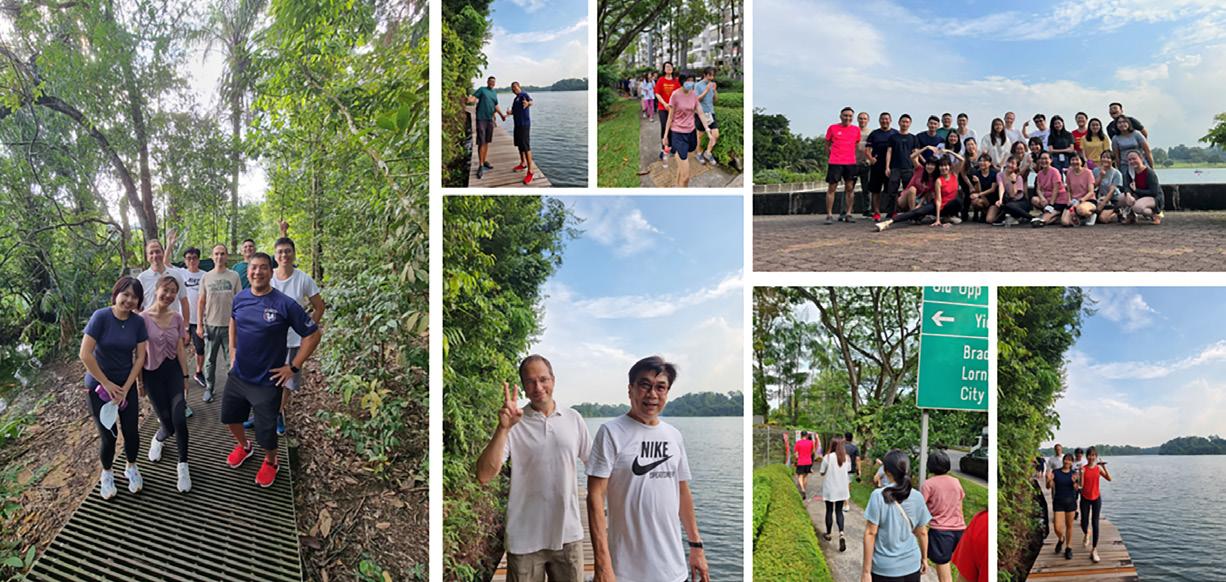
P u b l i c a t i o n 0 6Y e a r 2 0 2 2 119
Our Consumers
We seek to offer our consumers tremendous benefts that go beyond tightening world regulations and consumers’ normal expectations.
Clean labels
As a food manufacturer and marketeer, we aim to produce and distribute products which are as close to 100% natural as possible. We use additives only when it is not possible to do without.
Our promise is that our flagship trademark Ayam Brand™ should be synonymous with clean labels, which means:
• a short and honest ingredient list
• GMO-Free
• Preservative-Free
• MSG-Free
• Trans fat-Free
In 2018, we reinforced the above requirements with a new policy, named “Green Labels”.
Depending on the market, around 350 to 400 additives are legally authorized to be used for food. We have reduced the number of additives down to around one hundred, selecting only those additives with a pristine reputation.
D e n i s A s i a P a c i f c P t e L t dE . S . G . R e p o r t 120
With this initiative, we believe that we are paving the way for mass market food which is more natural, safer and healthier.
Mercury
Canned tuna is one of the main lines of our product ranges. We enjoy signifcant market shares in Malaysia, Singapore, and Brunei. The presence of mercury in pelagic fsh is one of the main concerns of tuna consumers.
We consider it our duty to inform consumers and to provide them with complete peace of mind when they consume tuna under our trademarks. We have therefore, since July 2016, sent each batch of our tuna production for mercury analysis by an independent laboratory.
From July 2016 to December 2022, we had 5397 batches of canned tuna tested.
• Mercury was not detected in or was not quantifable in 98 % of the batches. (The limit of detection is 0.04 ppm and quantifcation 0.13ppm).
• 2% of the batches had mercury levels ranging from 0.13 ppm to 0.27 ppm.
Stringent regulations worldwide fx a limit of 0.5 ppm of methyl mercury. As expected, our consumers can continue to enjoy our canned tuna without any worries about mercury.
P u b l i c a t i o n 0 6Y e a r 2 0 2 2 121
As far as we know, we remain the only mass market tuna brand worldwide to check all of its tuna production for mercury, despite this being ranked as the primary concern of tuna consumers.
Radioactivity
While the relevant authorities have ensured that the radioactivity level in all food distributed in our markets is safe, we are aware that it can remain a matter of concern for some of our consumers.
To address this concern, we test samples of every single batch of sardines and mackerel. As of end 2022, we had tested no fewer than 15,000 batches. Tests have consistently shown no radiation issues.
This therefore means that all analysis results have consistently been negative; consumers can be sure that the fsh produced under our trademarks is monitored and has not been exposed to radioactive pollution.
BPA
BPA stands for Bisphenol A. BPA is an industrial chemical that has been used to make certain plastics and resins since the 1960s. BPA is found in polycarbonate plastics and epoxy resins. Polycarbonate
D e n i s A s i a P a c i f c P t e L t dE . S . G . R e p o r t 122
plastics are often used in containers that store food and beverages. From 2011, Bisphenol A was prohibited in the composition of plastic for babies’ bottles due to concerns that the compound could act as a hormone disrupter.
In 2015, France went a step further and BPA was prohibited in all packaging coming into contact with food, including cans.
As we seek to comply with stringent global food regulations, DAP has, since 2015 (and under pledge number 5 in 2017), been working on the implementation of BPA -FREE linings in all of its cans. It is long, tedious, and demanding work with real time ageing tests, to make sure that the new lining is better and safer than the existing coating.
We have been able to introduce BPA-FREE linings in cans for all sardines and mackerel in tomato sauce as well as our range of coconut products. 92% of our canned tuna range is produced using cans with BPA-FREE linings.
Today, a very limited handful of products remain with coatings containing BPA as their real time ageing test was inconclusive. The R&D team will continue working on these products and an updated list of them will be published in every report to achieve full transparency.
The list of products which are not yet produced in cans with BPA-FREE linings as of end 2022 is as follows:
P u b l i c a t i o n 0 6Y e a r 2 0 2 2 123
• Barley
• The range of Baked Beans
• 4 canned tuna recipes (Malaysian Curry Tuna, Tomato Chilli Tuna, Black Pepper Tuna, 95 g Chilli Tuna, 95 g Deli Tuna Natural)
• The plant-based luncheon meat
During the second semester of 2022, due to metal can supply issues resulting from COVID disruption, we were forced to switch to nonBNANI cans for the production of 578,545 cartons of sardines and mackerel in tomato sauce. Since 2023, production of these two product ranges has resumed using cans with BPA-FREE linings.
Our ESG vision for our consumers is that they should be able to consume our products with total peace of mind, knowing that we have preventively addressed, checked, and solved any concerns they may have.
D e n i s A s i a P a c i f c P t e L t dE . S . G . R e p o r t 124

Our World
DAP companies have always been close to the communities in which they operate. Our companies have participated for many years in several social and charitable activities with local partners. There are multiple examples of this.
Community Care Campaign
To eat is a basic human need. As a food manufacturer and marketeer, our obvious duty is to provide vulnerable people in our direct proximity with healthy and quality food.
As an extension to Ayam Brand’s 130th Year Celebration of Taste of Home, Ayam Brand Community Care Campaign’s titled “Taste of Comfort” Cooking Workshop with Celebrity Chef Ili Sulaiman was organized to empower underprivileged kids with cooking skills. This was done through a healthy food workshop themed “Taste of Comfort” using Ayam Brand products to create simple yet nutritious dishes together.
Our long-running Corporate Social Responsibility Campaign, now in its ffteenth year, has contributed in excess of 2.1 million healthy meals to more than 26,238 people from 574 charity homes and NGOs over that period.
D e n i s A s i a P a c i f c P t e L t dE . S . G . R e p o r t 126
For the year 2022, Ayam Brand teamed up with food entrepreneur and TV personality, Chef Ili Sulaiman, who led the children in a cooking workshop that taught the importance of a balanced diet. Through simple demonstrations, the children learnt how to create their own nutritious meals like D-I-Y Comfort Pizza with ingredients such as Ayam Brand’s Saba Fish for a healthy dose of Omega-3. They also learnt to create Tropical Fruit Smoothie Bowls which they can replicate on their own at home using Ayam Brand’s Coconut Milk & Pineapple Chunks.
Ayam Brand also donated 2 months’ worth of products consisting of Ayam Brand Chopped Tomatoes 380g, Ayam Brand Saba Deli Mayonanaise 160g, Ayam Brand Tuna Mayonnaise 160g and Ayam Brand Baked Beans in Tomato Sauce 425g to 46 homes with more than 1,804 children, to create healthy meals.
Loan to the National Gallery
DAP owns an imposing masterpiece: an oil on canvas named “Chô Bo” by the reputed French painter Joseph Inguimberty. Joseph Inguimberty was a famous teacher at the School of Fine Arts in Hanoi. He was the mentor of most of the more reputable Vietnamese artists of the modern art period. “Chô Bo” is therefore considered a principal historical and artistic piece, representative of the master’s influence
P u b l i c a t i o n 0 6Y e a r 2 0 2 2 127
on a full generation of South-East Asian painters.
As part of our ESG vision, we are convinced that an artistic masterpiece such as this should not remain locked away in a safe, and as such, unseen, but should be shared with the largest audience possible. We therefore entered into contact with the Singaporean museums in order to lend them the painting at zero cost. The National Gallery of Singapore was enthusiastic about the loan as the canvas could become the central piece of the Vietnamese modern art gallery. Since 2021, “Chô Bo” has featured on the main wall facing a similar scene, “Panorama of Chô Bo”, a giant lacquer painting by his famous Vietnamese student Nguyễn Văn Tỵ.
Due to its 160-year history, the Group owns some other beautiful pieces of art, representative of the art history of Southeast Asia, that we are willing to lend to museums rather than keeping them locked away.
Event participation
Our staff are highly motivated, enjoying frequent participation in the social and charitable life of their communities. Over the last 2 years, the pandemic made our usual CSR activities more difficult. But as reported below, we did our best to continue most of our actions and to reach communities in need:
D e n i s A s i a P a c i f c P t e L t dE . S . G . R e p o r t 128
• In Malaysia we were, in 2022, in our 15th year of a food donation CSR program which is described in page 126 of this report.
• In Vietnam, our company donated a total of 840 cartons of Processed Peas and Baked Beans to 2 social protection centres taking care of orphaned children, the elderly and people with disabilities.
• Our Hong Kong office donated some organic coconut milk and plant-based drinks to charitable bodies before year-end in 2022, so the foods could be distributed before Chinese New Year.
• Our Beijing office continue to make donations to an Orphanage, providing free pasta and participation in their ‘One Egg a Day’ program in 2022.
• In Indonesia, our team organized a ‘Free Cardiovascular Counselling & Examination’ session with 100 participants.
• In Singapore, a beach clean-up activity was organized and was a huge success amongst our employees. Our company is a cosponsor of Sing’Theatre, a non-proft organisation whose mission is to be a creative platform that uses music and theatre to help shape inspiring futures. Sing’Theatre’s community outreach program brings joy to people in hospitals by providing musical performances.
P u b l i c a t i o n 0 6Y e a r 2 0 2 2 129
• In Thailand, food donations were made to 13 charitable associations in 2022. Our team has also volunteered to take part in a mangrove planting activity.
• In 2022, the Singapore head office also sponsored Musicfest, a series of regular events in Singapore hospitals where professional musicians and singers entertain patients and the medical staff with a view to improving their morale.
We also try as much as possible to mix fun days for our staff with ESG activities to engage them with the notion of sustainability:
• the EHS department in Taiping, Malaysia organized a Healthy Lifestyle Campaign. This was a 5-month program with three events: Blood Donation, Maxwell Hill Merdeka Hike, and Quiz. The objective of this campaign was to encourage our staff to enjoy a healthier lifestyle, encourage them to go for outdoor recreation, and to care for the community. Each participant was entitled to a limited-edition event badge and a lucky draw chance during the company’s Annual Dinner. We received an overwhelming response and support from the participants.
• In Vietnam, a family day was organized in our factory compound, which included a «green» cooking contest to elect a «Denis Chef», and a “recycled fashion” competition was held.
D e n i s A s i a P a c i f c P t e L t dE . S . G . R e p o r t 130
After two years of COVID, the participation of our staff was outstanding in 2022 and the following photos of the events are inspiring.
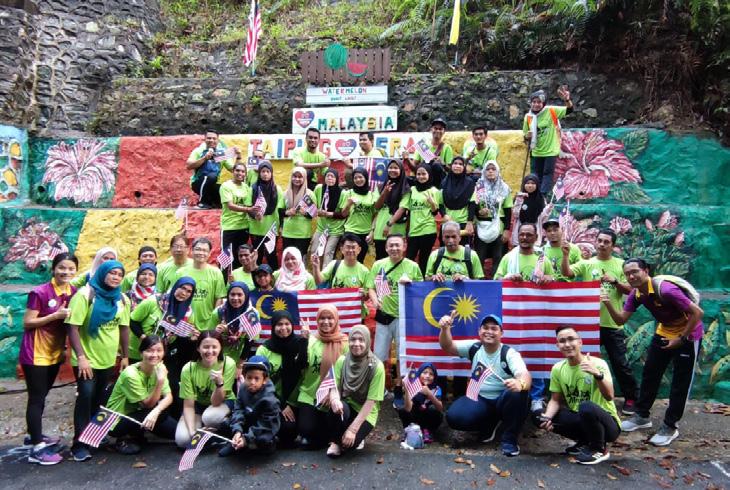
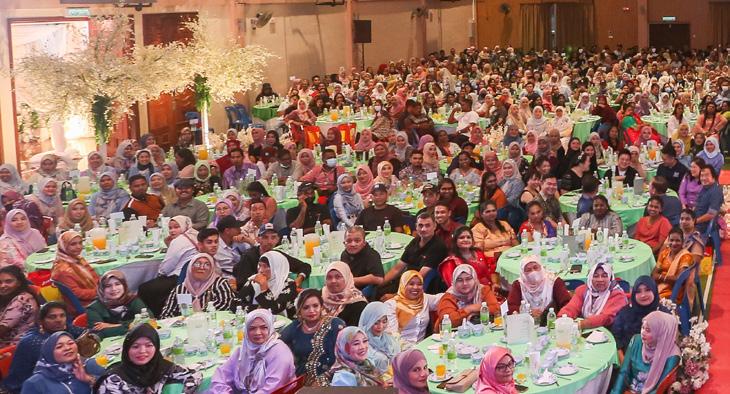
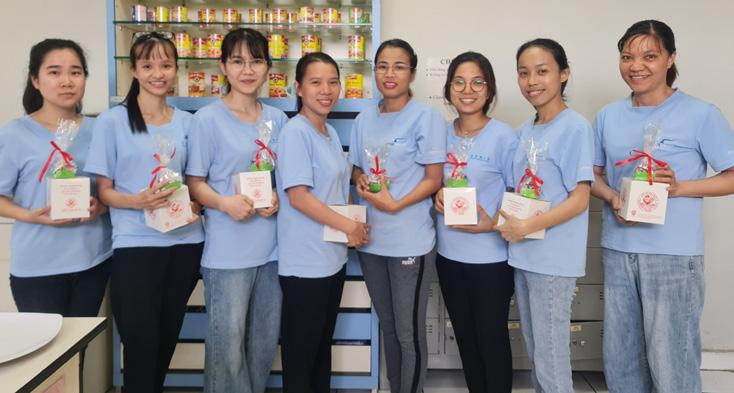
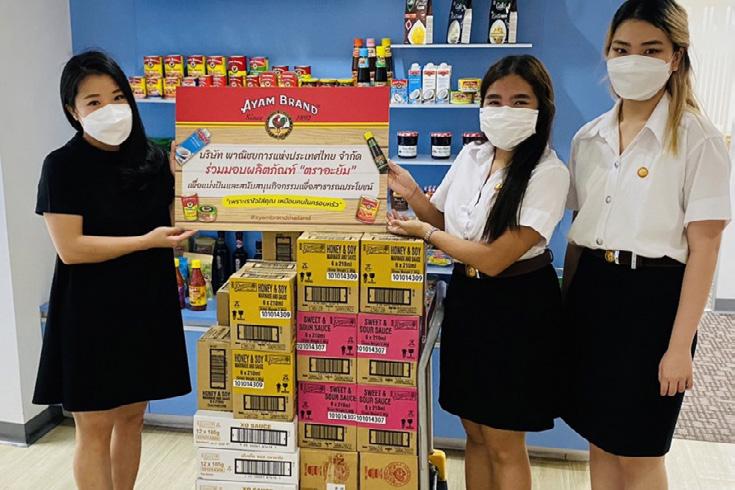
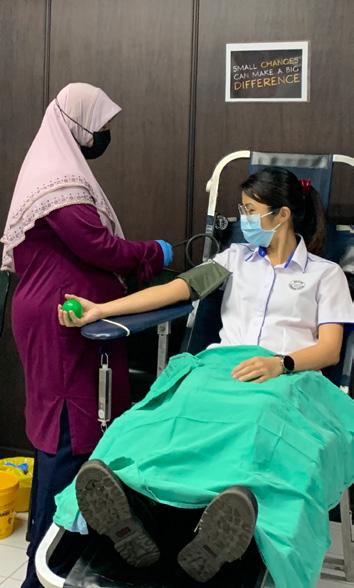
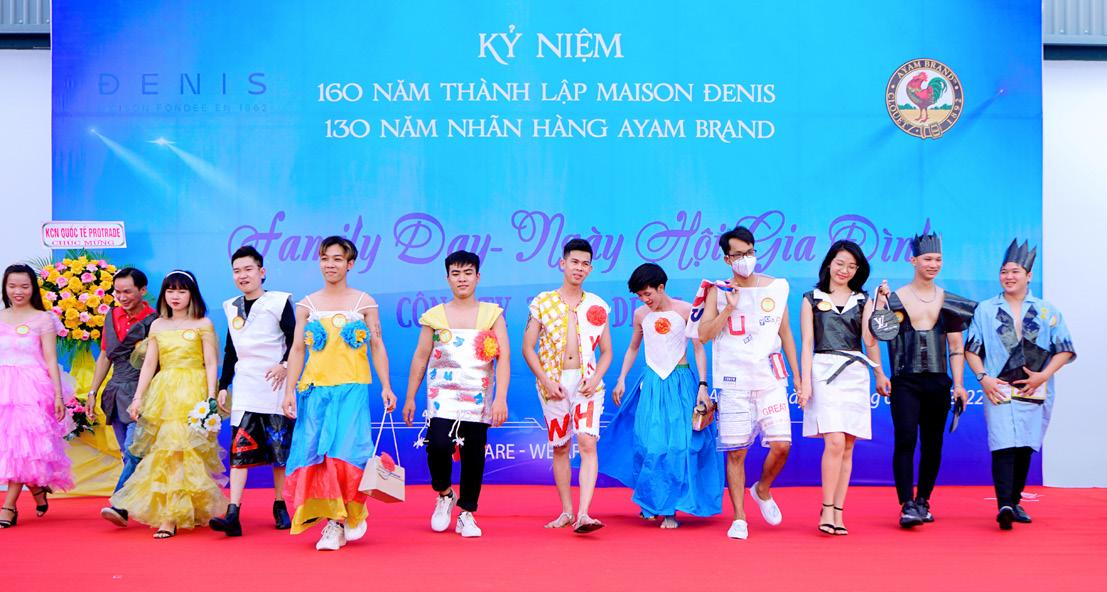
P u b l i c a t i o n 0 6Y e a r 2 0 2 2 131
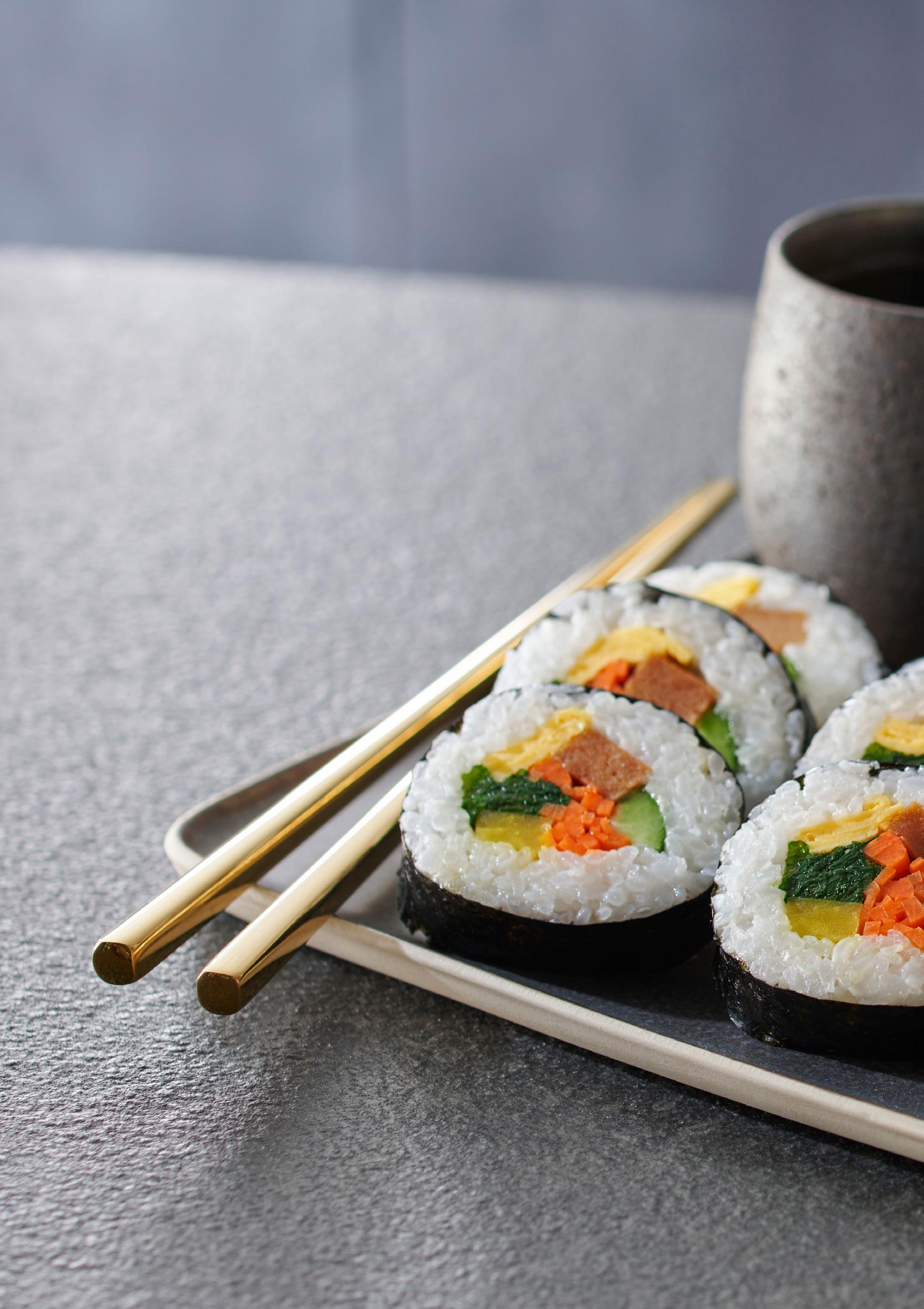
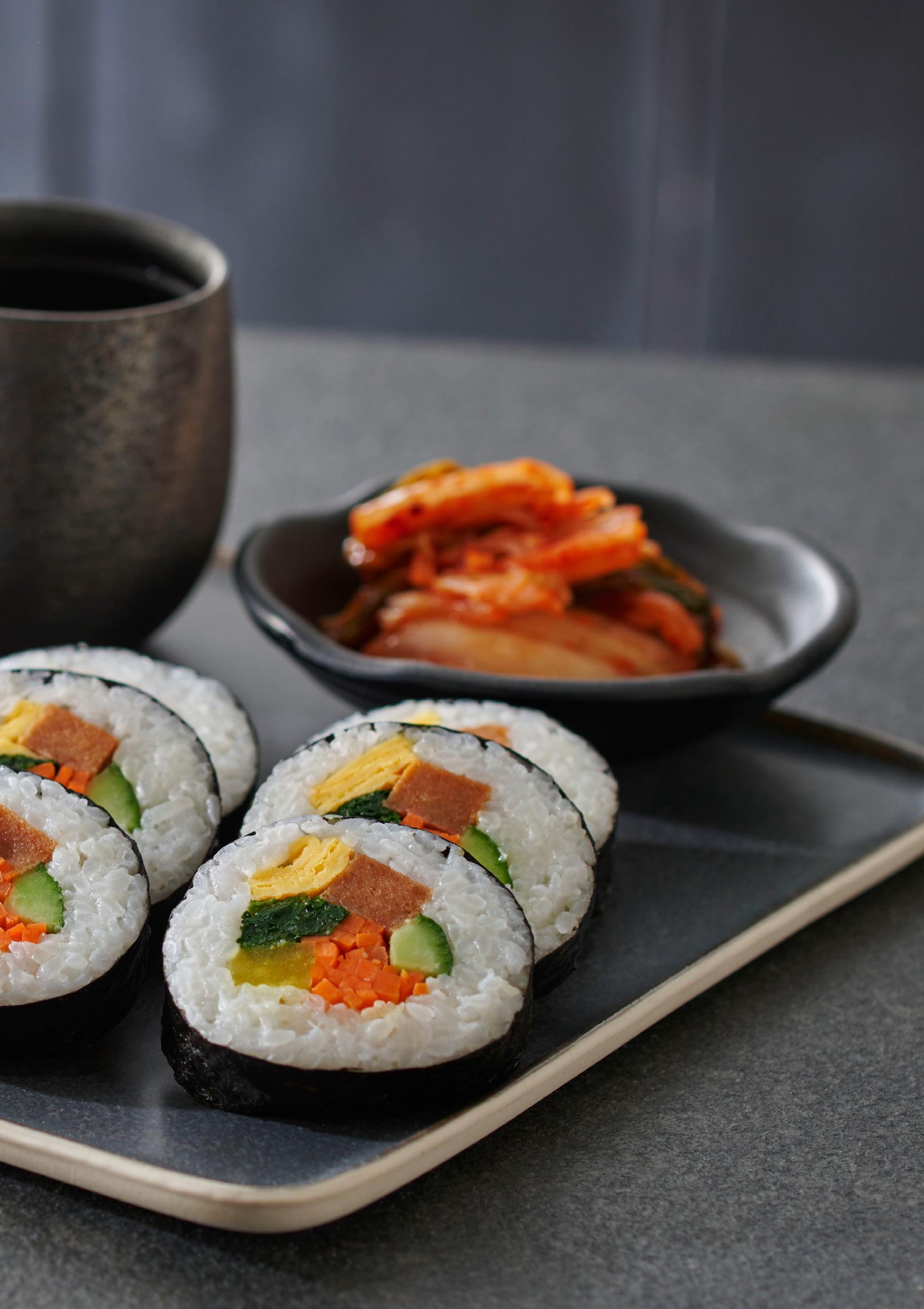 Musubi Wrap done with yumeat™ plant-based luncheon.
Musubi Wrap done with yumeat™ plant-based luncheon.
Governance
D e n i s A s i a P a c i f c P t e L t dE . S . G . R e p o r t 134
Governance and Ethics
DAP has an excellent reputation for governance and ethics, built with consistency and determination over its long business history. The company intends to remain committed to the highest ethical and professional standards and also to integrate new governance and ethics requirements as the world moves towards more transparency, complexity and globalization.
Since 2020, DAP management’s focus has been on the regional harmonization of best practice, better awareness of gender equality and the fight against corruption.
Governance
DAP, including its subsidiaries and related companies, is committed to the highest corporate governance practices.
The Board of Directors of Denis Asia Pacifc Pte Ltd consists of ten members, including the Group’s CEO with overall responsibility for strategy, investment, and bottom-line operations. As part of its commitment to best practice, the Company pays specifc attention to the composition of the Board and guidance thereof, the role and responsibilities of the Directors, access to information and conduct of shareholders’ meetings.
P u b l i c a t i o n 0 6Y e a r 2 0 2 2 135
Internally, an Audit Committee is in place, reporting to the Board of Directors with the responsibility to review audit plans for internal audit, to investigate any matters related to the Company’s internal control system and to work with external auditors to consolidate audited accounts.
Four directors of Denis Asia Pacifc Pte Ltd make up the Board of Directors of SFI Supply Management. This board adheres to the same principles of governance and audit protocols.
Ethics
(1) Code of ethics
DAP has a company code of ethics, which is published in the employee handbook and/or on the intranet for the companies that have it.
(2) Zero tolerance policy for severe wrongdoings
DAP has a zero-tolerance policy for severe wrongdoings. Employees and outside parties, such as suppliers, customers, contractors, and other stakeholders, are requested to report any issue to the management. They may use a website, ‘DG-report.net’, where their anonymity will be protected. The zero-tolerance text together with the whistle-blowers’ link are printed on the frst pages of text of the
D e n i s A s i a P a c i f c P t e L t dE . S . G . R e p o r t 136
employee handbook and on our main commercial and corporate websites. This may be used to report any concern or complaint regarding:
(1) Corruption and bribery
(2) Failure to comply with laws and regulations
(3) Harassment
(4) Discrimination based on gender, cultural background or origin, and disabilities
(5) Theft
(6) Forgery
(7) Misappropriation of funds and classifed documents
(8) Abuse and misrepresentation of power and authority
This procedure is meant to protect genuine whistle-blowers from any unfair treatment as a result of their report. Denis Group encourages employees and outside parties to put their names to their allegations whenever possible.
To be fair to any employee designated by an anonymous report, such reports will be examined by the Ethics Committee with a view to discarding frivolous claims and allegations without evidence. For serious and documented reports, it is the Ethics Committee’s duty to investigate and even to report to the police if required by the gravity of the offence.
P u b l i c a t i o n 0 6Y e a r 2 0 2 2 137
The Ethics Committee
The Ethics Committee has three main roles:
(1) to set ethics rules that apply to all companies under DAP, except if the local law regulates differently.
(2) to approve local company ethics & rules of behaviour.
(3) to deliberate on reports of severe wrongdoings and to suggest what steps should be taken by the CEO, including disciplinary sanctions or dismissal, if needed. Should the CEO choose not to follow the Ethics Committee’s recommendations, they must account to the company shareholders with his reasoning.
The Ethics Committee is made up of representative(s) of the shareholders, of the CEO, and representative(s) of the senior management. It should include at least one external member, chosen for his/her knowledge of the company and his/her moral standing.
As of today, the Ethics Committee’s external member is Mrs. Ai Ming Lee, Senior Consultant at Dentons-Rodyk, Singapore Justice of the Peace, Member of the Singapore Public Service Commission’s Disciplinary Panel of Persons, the Board of Visiting Justices and Board of Inspection of the Singapore Prison Services. and the Singapore Copyright Tribunal, and Independent Director on the
D e n i s A s i a P a c i f c P t e L t dE . S . G . R e p o r t 138
Boards of Temasek Life Sciences and Lendlease Global Commercial Reit.
The Ethics Committee met on January 30, 2023, to review the 2022 ESG period.
• There were two reports through ‘DG-report.net’ in 2022. They happened to be non-related to Ethics topics. The frst one was a consumer inquiry in Australia about the origin of soya in a soya sauce. The question was transferred to Sydney’s office. The second report was a suspicion of foreign matter in a can of baked beans in Singapore. The case was then transferred to the Quality Insurance department.
Despite no cases falling under the competencies of the Ethics Committee, the fact that consumers use this link to communicate with us proves that the link is clearly visible in our external public communication, such as our websites and this in the different markets.
We are also assured that the website is known by most of our employees, because it is a question included in the anticorruption test. It is also mentioned in the anticorruption policy that all staff must read and approve.
• The Ethics Committee discussed the future of the company’s
P u b l i c a t i o n 0 6Y e a r 2 0 2 2 139
ethics policies. The committee noticed that United Nations Global Compact replaced the yearly COP (communication on progress) in 2023 with an annual questionnaire. The questionnaire aims to establish the progress of the companies in writing, implementing, managing and controlling the application of the main policies - a must for any company today.
The committee decided that it would be reasonable and worthwhile to rewrite our policies and to align them with UNGC as far as possible.
An Ethics working group will work during the frst 6 months of 2023 to rewrite the policies, then designate a person to lead the audit function. The frequency of audit depends on the level of materiality of each policy for the company: from a yearly audit to an ad-hoc audit in the case of policy-breach.
The Ethics Committee decided also to focus in 2023 on two policies related to women.
• DAP should re-enforce its policy to prevent sexual harassment. This is in line with new regulations and authorities’ expectations in Malaysia.
• DAP should also update its policies relating to the empowerment of women.
The Ethics Committee reviews progress on the fght against
D e n i s A s i a P a c i f c P t e L t dE . S . G . R e p o r t 140
corruption and bribery, as decided by the shareholders and the CEO during the previous Ethics Committee meeting. The plan specifes different obligations to be fulflled according to the risk of various categories of employees being exposed to corruption:
• Factory and warehouse workers should receive training and should sign an anti-corruption pledge.
• Every two years, office employees have to complete an e-learning programme on anti-corruption and bribery and obtain an e-certifcate. The management team defned the content of the e-learning based on the advice of law frms in our various markets and confrmed a common text for them, based on the most stringent regulations. The e-training started at the beginning of 2022 and was extended to all DAP companies until the beginning of 2023. Vietnam and China were postponed to the frst semester 2023 due to legal translation issues.
The anti-corruption e-certifcation is mandatory for all office staff up to the CEO.
• Staff potentially at risk (sales, procurement, marketing,…) will have training sessions every two to three years with specialists (anti-corruption bureau, consultants or lawyers) and must sign a specifc written pledge. The Group HR manager is working on a selection of expert companies to conduct this training in 2023.
P u b l i c a t i o n 0 6Y e a r 2 0 2 2 141
In our Group vision, corruption and bribery will result in suspension of work during the investigation and if proven, automatic dismissal and reporting to the relevant public authorities. The zero-tolerance tone at the top should be understood by all company employees.
At the time of the report, 93% of the 401 executives and managers have passed the anti-corruption test, got the anti-corruption certifcate which is valid for 2 years and approved the company anti-corruption policy.
40% of the 1299 factory and warehouse workers received anti-corruption training and signed the anti-corruption pledge.
Sustainable Financing
In 2022, we studied several banks’ proposals for sustainable banking facilities.
All our investments are already done through the flters of our ESG strategy, but “sustainable fnancing” could help promote DAP’s ESG vision and stakeholders’ engagement. It could also be part of helping our partners evolve to meet the demands of a responsible and circular economy.
In 2022, we did not fnd a sustainable fnancing solution which was practical and relevant to our business and the size of our company.
D e n i s A s i a P a c i f c P t e L t dE . S . G . R e p o r t 142
Testimony from our partner companies
Polar Bear Mission Company Limited (freshket.co)
freshket is an end-to-end food supply chain platform that uses technology to enable the food supply chain system’s efficiency by streamlining all nodes in the food industry in an efficient way to deliver high-quality food supplies to HoReCa businesses. With a mission to move the food supply industry towards sustainability, freshket has integrated sustainability into its business practices in order to make a positive impact that contributes to the world and society as a whole.
Maison Denis has invested in freshket in its early stages since 2019, and has been playing a pivotal role in promoting sustainability across different angles of its business, focusing on developing a business model that aims to reduce waste production.
The collaboration between freshket and Maison Denis has continued and strengthened the business model to achieve superior operational efficiency and productivity, resulting in resources efficiency in consumption and production, as well as the creation of decent and fulflling jobs while minimizing environmental impact, which aligned with our mutual goals to strive for long-term sustainable positive impacts.
P u b l i c a t i o n 0 6Y e a r 2 0 2 2 143
Tofu with rice done with a yumeat™ plant-based minced meat in mapo tofu sauce.


Testimony from our partner companies
Alce Nero S.p.a.,
Italy
Alce Nero Asia: a winning partnership
Maison Denis was founded in 1862 and is a group of companies still controlled by the heirs of the French founder, Etienne Denis. The business activities of the Denis family have always focused on Southeast Asia and today the group pursues its main activities, mainly in the Food industry, in the Far East. Convinced of the need to offer increasingly safe, healthy and environmentally friendly foods, Maison Denis has forged a solid partnership with Alce Nero.
In 2006 Alce Nero and Maison Denis established a Joint Venture, Alce Nero Asia Ltd which coordinates development strategies for the Alce Nero brand throughout the Far East (including China and Japan) from its headquarters in Singapore.
The rules governing this Joint Venture are clear and simple: Alce Nero S.p.A produces in Italy and Alce Nero Asia Ltd. then imports, promotes and sells the produce on site, via the operative and commercial companies of Maison Denis present in almost all Far Eastern countries. Thanks to this collaboration, not only is Alce Nero the undisputed leader of the organic market in these areas, but it is also one of the most widely distributed and visible organic and non-organic Italian food brands. Specifcally, Japan is the country in which Alce Nero has achieved the best results after Italy, both in terms of sales and reputation.
(Alce Nero Sustainability Report 2021, page 124)
https://www.alcenero.com/pages/bilancio-di-sostenibilita-alce-nero
D e n i s A s i a P a c i f c P t e L t dE . S . G . R e p o r t 146
by our CEO
After a couple of years navigating our way through turbulent times, we hope to return to a more stable situation in the year 2023 and beyond. We remain positive and ambitious about our ESG plans.
Our ESG fundamentals remain unchanged while we continue moving towards operations with minimum environmental impact along the value chain.
2023 will be a busy year as far as ESG is concerned. I would offer two examples: the installation of solar panels on our Vietnamese factory, which will contribute to a signifcant decrease in our GHG emissions, and the total rewriting of our governance policies in view of a better understanding of current requirements.
Maison Denis continues to look towards the future and remains committed to delivering the following ESG goals (1) carbon neutrality by 2040 (2) 100% packaging recyclability by 2030 and (3) 100% Green Building certifcation by 2030.
The 10 pillars of the United Nations Global Compact, our 10 mediumterm commitments and our 5 Sustainable Development Goals detailed in this report defne the framework within which our efforts are deployed.
I would like to thank all employees and partners for the support and dedication to the sustainability vision of our Group.
P u b l i c a t i o n 0 6Y e a r 2 0 2 2 147 Conclusion
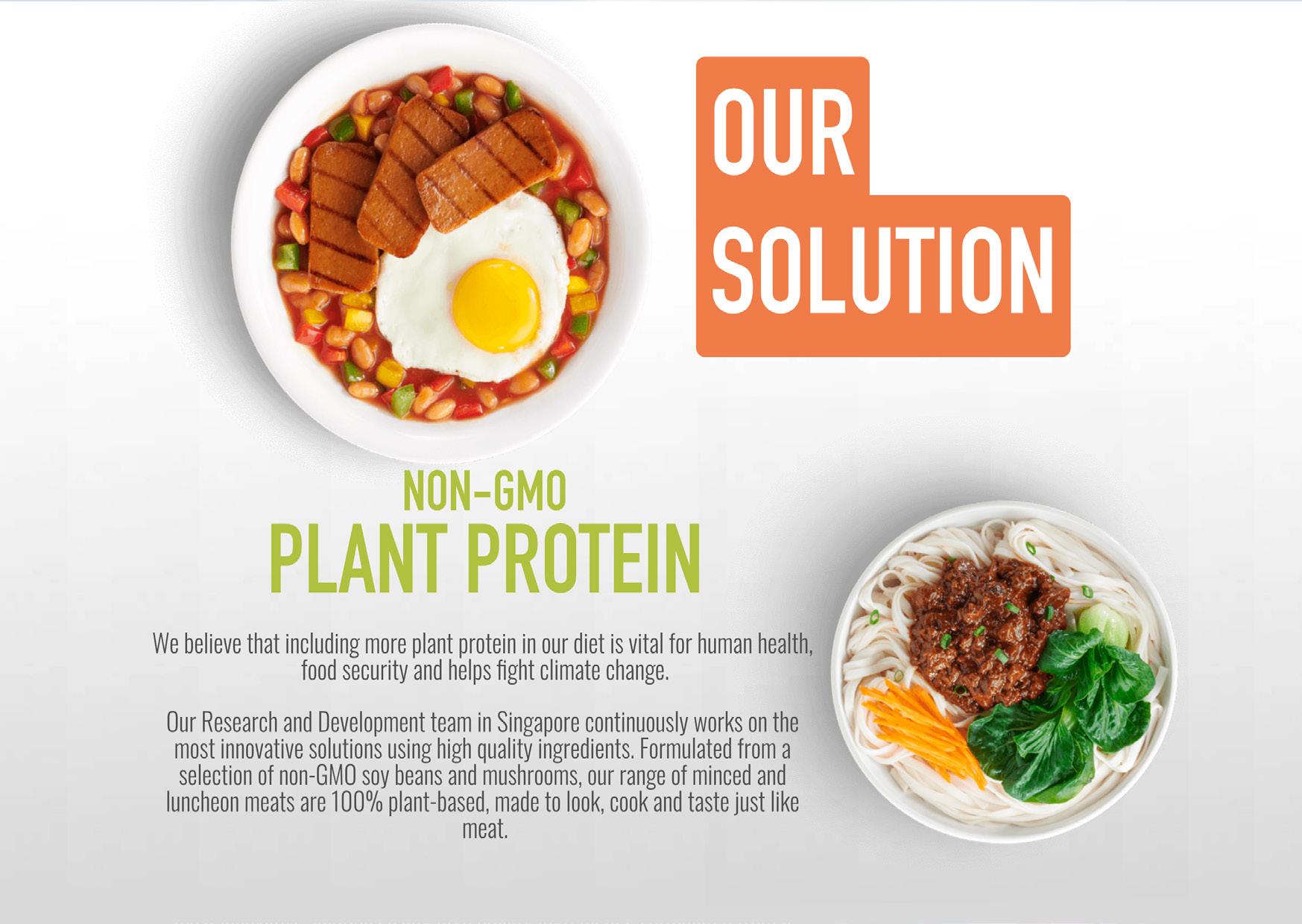
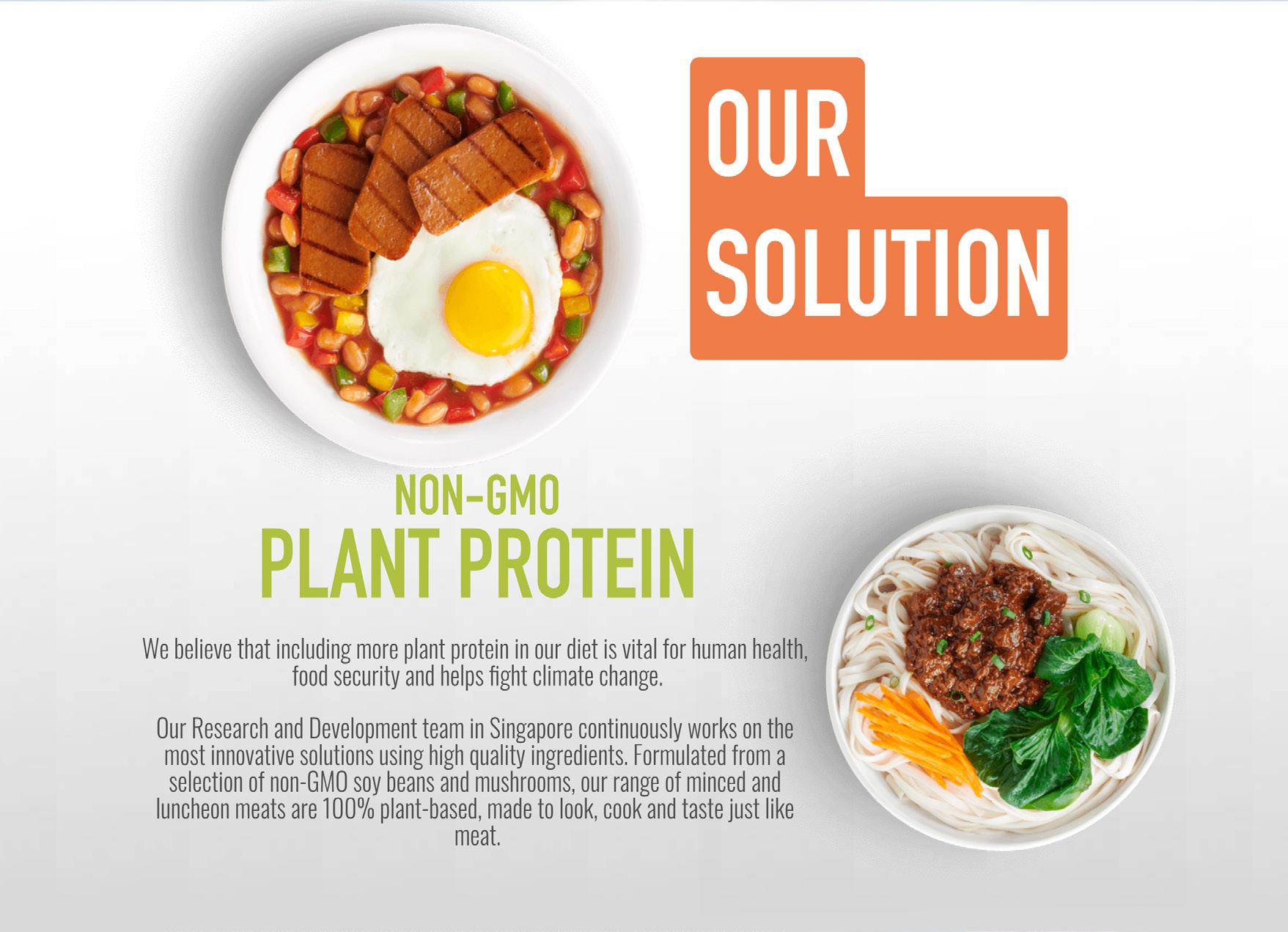
D e n i s A s i a P a c i f c P t e 148 ESG committee Denis Asia Pacific Pte Ltd Denis Building 21 Tagore Lane Singapore 787479



 Gyoza done with yumeat™ plant-based Minced Meat
Gyoza done with yumeat™ plant-based Minced Meat




 Yumeat™ plant-based Luncheon
Wanpaku Sandwich
Yumeat™ plant-based Luncheon
Wanpaku Sandwich
 Guillaume VIRANTIN Group Senior Digital Manager Denis Asia Pacific Pte Ltd Maison Denis, 1862
Guillaume VIRANTIN Group Senior Digital Manager Denis Asia Pacific Pte Ltd Maison Denis, 1862












































 Musubi Wrap done with yumeat™ plant-based luncheon.
Musubi Wrap done with yumeat™ plant-based luncheon.


















